- High School
- College Search
- College Admissions
- Financial Aid
- College Life


Juniors, Now’s the Time to Schedule Your College Visits
Juniors, it’s time for you to get started on college visits.
Whether you’re thinking about knocking out one or two or hitting a series of colleges, here is your go-to guide for setting up a college visit.
We’ll walk you through a steps to take before, during and after visits to help you find your perfect fit.
And if COVID-19 protocols are still underway, don’t miss our article about what to do when you can’t tour colleges in person .
What Can Juniors Do Right Now?
Juniors can do a lot right now, including developing a checklist and other things you can put on the family calendar.
Step 1: Start talking.
That’s right. Sit down and have a conversation with your family.
What are you thinking you want to do for college? Do you think you want to go to a large school? A small school? What fits your personality and preferences?
Start talking with adults you trust about schools that make sense for your needs.
Step 2: Brainstorm.
Have no idea where to start? Start a brainstorming session where you write down your visions about what you think your college experience might be like.
Rather than throwing a dart at a map and jumping in the car, it’s a good idea to ask yourself a few questions:
- Do you see yourself going to a large or small school?
- Do you want a lot of personalized attention?
- Are you looking for a more selective institution?
- How far away from home do you want to live?
- When you envision college, what do you think of?
In other words, think broadly about your college visit choices, then think more narrowly about the colleges you’d like to visit.
Put a premium on relationships when you make this list.
What kind of people do you want to meet? What type of individuals do you want to learn from?
Remember, college is about way more than pretty residence halls, beautiful buildings and other aesthetic things. It’s about the people who influence you along the way.
Step 3: Research at least one college.
Choose at least one college and do as much research as you can. Learn more about that particular school’s:
- Admission criteria
- Results — how many students go to graduate school, get a job after graduation, etc.
- School profile
- Academics and selectivity: Are you looking for a serious academic environment? Would you rather go to a school that focuses on undergraduate teaching — or research?
- Potential majors
- Housing information
- Extracurricular activities
- Athletics opportunities
After you narrow down some of the “big” things, like distance from home and general experience, then you can start thinking about things like major, requirements and more.
Does this college college or university you’ve researched fit the bill? If not, look for another one. If that one makes sense, move toward school as your first visit.
Step 4: Check the calendar.
Once you’ve honed in on your first college to visit, figure out what visit day fits into your schedule. Check your calendar and your family members’ calendars too. Remember, mom and dad likely have to drive you to your visit or coordinate flights. You need to plan the visit with your parents, and you might need to make sure your brothers’ and sisters’ schedules are open too.
How to Set Up a College Visits
First of all, make sure you (the student!) call the schools where you’re interested in setting up a visit.
Your mom or dad should not make the call. It’s time to put some of those adulting skills into practice.
Step 1: Think through what you want to do on your visit.
Who are the must-see people on your radar—the soccer coach, tutoring center, a financial aid advisor? It’s OK if you’re not sure. You can work through some of these questions when you make your phone call to the admissions office.
Step 2: Call the college or university’s admissions office.
Don’t set up a visit online. Talk to an actual person.
Or, if you do set up a visit online, call and make sure the admissions office received your scheduled visit—and that it didn’t get lost in cyberspace.
Have a detailed conversation about what you’d like to do when you’re on the visit.
Step 3: Ask for a personal campus visit.
Try to steer clear of group visit days.
Naturally, you’re an individual and have specific interests and needs.
When you’re stuck on a group visit, no one student will have the same interests as you. You could get stuck touring the gym for 25 minutes of your hour-long tour (even if you’re not an athlete or hate the thought of a treadmill). Who wants that?
A personal campus visit ensures your visit is all about you and nobody else.
Step 5: Get ready!
You don’t want to start a college visit without doing some preparation. You want to know as much as possible about the college you’re visiting before you visit.
Simple. You don’t want to waste time learning stuff you already know. If you already know the basics, like the size of the college, majors available and costs, why spend time relearning stuff you already know?
Plus, it brings camaraderie with the admission staff or chemistry professors when you say, “Yeah! And that biochemistry secondary major—that sounds cool.”
You’ll never believe how much people’s eyes light up when you know something about the college or university already.
What to Do During/After Visits
When you arrive at the admissions office, go to the campus visit coordinator’s desk and introduce yourself. That individual will help you get your day started in the right direction.
While you’re on your visit, do your best to ask great questions. You want to think of questions before you visit and ask everyone questions. Get each person talking about the college or university you’re visiting. It’s best to get candid thoughts from each individual you talk to.
This may sound like a pain, but it’s a good idea to get all your thoughts together and take a minute or two to jot down all your initial reactions to the college you’ve just visited. Grab your phone and type in some notes on the card or plane ride home.
Believe it or not, it’s difficult to remember each individual school after your 10th college visit.
Now’s the Time!
Juniors, we’ve offered everything you need to know about how to schedule a college visit .
It’s a matter of sitting down with your family members or other trusted adults, pouring over Niche’s 2021 college rankings and making lists of what matters to you.
It’s going to be a great time, so have fun with the process.
Ready to Find Your Niche? Create an Account
Author: Melissa Brock
Melissa Brock is the founder of College Money Tips and Money editor at Benzinga. She loves helping families navigate their finances and the college search process. Check out her essential timeline and checklist for the college search!
More Articles By Niche
While many current college students tout the importance of being able to actually step foot onto the campus you might go to, sometimes the circumstances just do not work out.
At Niche, we know a college is more than its stats or buildings. We also know it can be hard to figure out a college’s vibe or how students feel about it from its website alone. Using our comprehensive college profiles and social media accounts, you can get a sense of what life at a college is really like. Here are three simple ways to do that.
In case you haven’t heard yet, Niche has an amazing new opportunity for high school seniors. Niche Direct Admissions is a program that allows participating colleges to accept students and offer scholarships based on their Niche Profile. That’s right — no application needed.
College Visits Essentials: Making the Most of Your Campus Tours
College visits essentials.
Embarking on college visits and campus tours marks a significant milestone in the college search process. These experiences offer invaluable opportunities for prospective students to explore potential colleges firsthand, gaining insights into campus life, academics, and extracurricular opportunities. As you begin compiling your college list and narrowing down your choices, college visits can help you make informed decisions about your future.
In this article, we’ll delve into the essentials of college visits, offering practical college visit tips and a college visits checklist for maximizing your experience . We will cover everything from uncovering the questions you should ask during a college tour to understanding how to schedule and plan college visits effectively. And, we’ll look at things you may not have thought about, including having virtual college visits, conducting a self-guided tour, and navigating college campus tours safely and effectively.
We promise this article provides everything you need to know regarding the college visit process. Whether you’re just beginning your college search or fine-tuning your college list, these insights will help you navigate the complexities of the college visit process with confidence.
Let’s get started!
Are College Visits Important?
When making one of the most significant decisions of your academic career, the role of college visits in the college search process cannot be overstated. College campus tours are a crucial part of the decision-making process, offering firsthand insights that can influence your college search.
First and foremost, college visits allow you to immerse yourself in the campus environment and explore academic facilities, dormitories, and recreational amenities. Whether you’re passionate about conducting research in state-of-the-art laboratories or participating in vibrant student organizations, visiting a college in person lets you assess whether it offers the resources and opportunities you seek.
Moreover, college visits offer the chance to interact with current students, faculty members, and admissions staff, providing invaluable perspectives on academics, extracurricular activities, and campus life. These personal connections offer unique insights you simply can’t gain from a website or brochure.
Ultimately, the information and impressions gathered during college visits can significantly impact your college choice. By experiencing campuses firsthand, you can effectively consolidate your college list and compare your top colleges by understanding which colleges resonate with you. Before you make your final decision , you can use the information collected on the campus tours to demonstrate your interest in the college or university, increasing your chances of acceptance.
What Should I Ask On A College Tour?
While college visits and campus tours provide invaluable firsthand experiences , it’s essential to do your homework before stepping foot on any campus. Here’s one of our “pre” college visit tips–conduct thorough research beforehand to help you make the most of your visit. By asking the right questions , you can gather the information you need to make an informed decision about your college choice.
Questions about academics
One crucial aspect of pre-tour research is identifying academic programs and resources that interest you. Take the time to explore the college’s website and familiarize yourself with the range of majors, minors, and academic opportunities available. Here are a couple of questions you may want to ask:
- Can you provide more information about the [specific major/program]?
- Are there opportunities for undergraduate research or internships in [area of interest]?
Questions about campus life
In addition to academic offerings, consider campus life and student services that you would like to know more about. Research the college’s extracurricular activities, student organizations, and campus events to understand the social and cultural opportunities available. Here are other questions you may want to ask:
- What types of student organizations are active on campus?
- Are there opportunities for community service or volunteer work?
More college visit questions
Furthermore, consider other aspects of the school that might not be immediately obvious. Research housing options for juniors, including on-campus dormitories, off-campus apartments, and housing policies for upperclassmen. Also, consider things like parking availability and policies regarding cars on campus. Consider asking questions such as:
- What are the housing options for upperclassmen, and how is housing assigned?
- Is parking available on campus for students, and are there any restrictions on bringing cars?
Conducting thorough research, and making your college visits checklist, is essential for making the most of any college visit.
How Many College Visits Should I Do?
When determining how many college visits you should do, you’ll need to strike a balance between quantity, quality, and expense. While visiting as many colleges as possible may seem ideal, college visits can get pricey. Therefore, it’s crucial to personalize your college visit plan to ensure that you make the most of your time, energy, and financial resources.
Here are some steps you can take to help prioritize your college visits and ensure you are completing the right number of college campus tours:
Four Steps to Planning College Visits
1. start with a broad college list.
Have a wide range of colleges that interest you, encompassing various types of campuses such as big versus small, urban versus rural, and public versus private institutions. Consider including HBCU college tours or schedule one or two Harvard tours. Having a broad college list lets you gain insights into the diverse campus environments and refine your preferences accordingly.
2. Prioritize your top choices
Once you’ve identified your top 3-5 colleges on your college list, prioritize visiting these campuses. Consider planning multiple trips in various capacities if you’re highly interested in a particular school. For example, you can schedule an online UCLA campus tour. Then, schedule an in-person prospective student UCLA campus tour. You can even conduct a self-guided tour versus an official UCLA campus tour to have more flexibility in where you’ll get to go on campus.
3. Balance depth with practicality
While visiting as many colleges as possible can be beneficial, consider the practicalities of your college visits checklist. Virtual college tours and information sessions can be valuable alternatives for colleges that are harder to visit in person. For instance, Harvard tours can be in-person or virtual. Therefore, if Harvard is on your list, plan your Harvard tours accordingly based on your availability and resources.
4. Consider special programs
If you’re invited to special programs for admitted students or specific academic departments, prioritize these college visits. Special programs through HBCU college tours or college visits for juniors often offer opportunities to interact with faculty, current students, and other admitted students, giving you a firsthand glimpse into life on campus.
Next, let’s discuss how to plan and schedule a college visit.
How To Schedule College Visits
Planning your college visits involves careful coordination and scheduling to ensure you make the most of your time on campus. From considering academic calendars to contacting college admissions offices, here are some college visit tips regarding scheduling your campus tours effectively.
Here are two of the most important things to keep in mind when working on the logistics of your campus visits.
How to Work on Logistics of Campus Visits
Consider academic calendars.
Plan your college visits around academic calendars. Before scheduling your college visits, consider the academic calendars of the colleges you plan to visit. Check their websites to determine the dates of important events, such as orientation sessions, midterm exams, and holidays. This is important whether you are planning college visits for juniors, HBCU college tours, or any other kind of college visit.
Contact Admissions Offices
Contact college admissions for tour scheduling. Once you’ve identified potential college visit dates, it’s time to contact the admissions offices or go to the admissions website to schedule your campus tours. Most colleges offer guided campus tours led by student ambassadors or admissions staff. Additionally, many schools host information sessions that provide an overview of the college’s programs, resources, and admissions process.
Scheduling college visits: step-by-step
Let’s take a look at a hypothetical example to better understand the steps it takes to schedule a campus tour. Imagine you’re a high school student living in Chicago. You have already completed a University of Chicago tour, and now, you’re interested in scheduling a tour of the University of Southern California (USC) in Los Angeles. As an in-state college, accessing the University of Chicago tour may have been simple. But let’s look at how you can navigate the scheduling process of an out-of-state college tour:
Navigating an Out-of-State College Tour
- Research USC’s academic calendar to identify optimal visit dates that align with your availability.
- Visit USC’s admissions website to find information about campus tours and information sessions. Determine whether USC offers guided tours, self-guided tours, or virtual college visits for prospective students unable to visit in person.
- Use the USC campus tours website to schedule your campus tour. In addition to scheduling an admissions tour and presentation, consider scheduling an academic department presentation.
- Upon confirmation of your campus tour reservation from USC’s admissions office, make travel arrangements from Chicago to Los Angeles. This includes booking flights, accommodations, and transportation to and from the USC campus.
- Plan your itinerary for your visit to USC. Consider attending guided campus tours, participating in information sessions, exploring campus facilities, and engaging with current students and faculty members.
- During your visit, bring your college visits checklist. Take notes, ask questions, and gather information to help you decide whether USC is the right fit for you.
Since the cost of college visits is a big factor to take into consideration during the planning process, let’s discuss it further.
Are College Visits Free?
As you begin to make your college visit list, you’ll need to understand the costs associated with college visits. While some campus tours may be free, others require careful budgeting and planning to manage expenses.
College visits can incur various expenses, including transportation, accommodation, meals, and miscellaneous fees. While some colleges offer free guided campus tours and information sessions, others may charge a nominal fee for certain services or events.
Tips for managing the cost of college visits
To manage the costs associated with college tours effectively, consider the following college visit tips for budgeting and finding free visit opportunities:
Start planning your campus tours well in advance to take advantage of early booking discounts and special promotions. Research travel options, accommodations, and local amenities to identify cost-saving opportunities and plan your itinerary accordingly.
Utilize virtual college tours
Besides visiting colleges in person, explore virtual college tours offered by colleges and universities. Many institutions, such as Boston College and Harvard University , provide virtual college visits and information sessions that allow you to explore campus facilities, interact with admissions staff, and learn about academic programs from the comfort of your home at no cost.
Explore fly-in programs
Several colleges and universities offer fly-in programs. These programs typically cover travel expenses, accommodations, meals, and participation in campus activities, allowing students to experience campus life firsthand without incurring any costs.
Speaking of fly-in programs, let’s learn a little more about them.
Fly-in programs
Here are three great fly-in programs/opportunities for low-income students.
1. QuestBridge College Prep Scholars Program
College visits for juniors are incredibly important. QuestBridge offers a College Prep Scholars Program for high-achieving, low-income high school juniors which, you guessed it, sponsors college visits for juniors. This program provides participants access to college admissions resources, mentorship opportunities, and fly-in college visits for juniors to top colleges and universities across the United States. Beyond giving fly-in college visits for juniors, QuestBridge takes it a step further and will help fund your attendance to top summer programs at some of the most prestigious colleges in the country.
2. Tulane University, PreviewTU Program
PreviewTU is a campus visit program at Tulane University that typically occurs in the fall. While open to all, students who identify as first-generation college attendees, LGBTQIA+, are from low-income backgrounds or rural/small-town residents, and/or students of color are particularly encouraged to attend. The program is offered both virtually and in person. PTU activities include campus tours, student panels, admissions and financial aid sessions, lunch with Diversity Fellows, and opportunities to connect with professors and support partners. Financially disadvantaged students may qualify for partial travel reimbursement stipends of up to $500 for themselves and one guest.
3. Massachusetts Institute of Technology, Weekend Immersion in Science and Engineering (WISE)
MIT’s Weekend Immersion in Science and Engineering (WISE) is a three-day program for rising seniors to explore MIT life. It’s fully funded, covering transportation to and from MIT. Applicants from underrepresented backgrounds, including Black, Latinx, and Native American students, those from lower socioeconomic statuses, and first-generation students, are strongly encouraged to apply. WISE typically occurs in September. Participants reside on campus with MIT undergraduates, engaging in academic and campus life activities. They meet peers and faculty and attend college admissions and financial aid workshops. Applications are due in August, and the program generally takes place in October.
At this point, we’ve covered college visit tips for preparing for your visit. Now, let’s discuss what to do when you’ve finally made it to campus!
Things To Do On A College Visit
As shared earlier, college visits offer students a chance to get a feel for the college campus and community. Therefore, while on a college visit, it’s important to take advantage of all the things to do on campus and within the surrounding community or area. Here are 3 things to do on your college tours and college visits:
3 Things To Do on College Visits
1. attend information sessions and campus tours.
This may seem obvious but don’t bail on the planned tours and sessions. They’ll give you valuable information about the school and campus. These parts of the college visit are just as important as exploring on your own. Don’t forget to bring your list of questions and ask about anything that isn’t answered!
2. Inquire about attending classes or talking to current students
Besides attending information sessions and campus tours, ask about the possibility of attending classes or speaking with current students during your visit. Observing a class in your area of interest can provide valuable insights into the college’s academic rigor and teaching style. Similarly, chatting with current students can offer firsthand perspectives on the overall student experience.
3. Explore the campus
Don’t be shy when you’re visiting a college’s campus. Wander around and imagine yourself living or studying there. Check out all the different areas of campus. Basically, get a feel for the vibe of the school–trust your intuition and see if it feels like a fit.
Don’t forget to consider the area outside of campus. Evaluating the surrounding community of a college campus can provide valuable insights into the overall quality of life and opportunities available to students during their college experience. Think about the amenities and resources that are important to you. Consider adding these questions to your college visits checklist. Are there nearby music venues, art galleries, or cultural attractions that align with your interests? What transportation options are available, including airports or public transit systems? No detail is too small to ask about on your visit to campus.
When Should You Start Visiting Colleges?
Navigating the college search process is undoubtedly complex. Next, we will cover some tips on when to set up your first college visit. There isn’t a hard and fast rule to this question, but there are certainly some best practices when it comes to planning college visits.
It is never too early to begin visiting colleges. College admissions offices receive tour requests from students as young as 6 th grade. If you plan to visit a college any time before your 9th-grade year, it is important to remember that you may need to tour the college again before applying and certainly before enrolling.
Going on a college visit as a younger student can begin planting the seeds for what college is like. But very rarely will a college visit before high school provide you with meaningful admissions information that you will be able to retain and act on when it is time to submit your application.
College visits for juniors and seniors
As you get closer to your junior and senior year of high school, college visits become more than just an opportunity to understand college more broadly. College visits for juniors and seniors can help students discover their preferences. At this stage of the college search process, students can begin to discern the type of college campus they might see themselves ultimately enrolling at.
Whether you are on a UCLA campus tour in California, a University of Chicago tour in Illinois, or a Harvard tour in Massachusetts , you can begin to explore your regional preferences. Additionally, experiences on HBCU college tours can give you some insight into distinct institutional types. Note how you felt about your HBCU college tours at institutions like Spelman College or Howard University compared to other universities. College visits do more than show you what colleges you might like, they also expose you to colleges that might not be a good fit.
Managing the logistics of college visits
Campus visits are often hard to arrange because of the time and resources they require. If you are planning to go on multiple college campus tours, you may find a strain on time and resources. A student who lives in Florida may find that attending a UCLA campus tour is much harder to plan than attending a campus tour at the University of Florida. Because of this, many families begin planning their campus visits far in advance. There are also opportunities to visit campus at the last minute. However, these trips typically align with other travel or are at campuses close to the student’s home.
In addition to prospective student visits, you may have the opportunity to visit campus as an admitted student. Admitted student college visits often include a more immersive experience than a college campus tour for a prospective student. Even if you have already visited campus, admitted student visits will often equip you with all the information necessary to make your final college decision .
College Visits During Coronavirus
The coronavirus pandemic resulted in additional access to college admissions information. During the pandemic, colleges and universities added an increased number of virtual college tours, online information sessions, and other virtual opportunities to learn more about colleges in the absence of in-person college campus tours. Virtual college tours allow students to access information at any time and refer to these virtual college tours when questions arise.
The pandemic also resulted in additional safety measures for college campus tours. At the height of the coronavirus pandemic, college campus tours were completely halted. As campus tours resumed, colleges adopted mask mandates, reduced tour capacity, and made changes to tour stops. The largest safety measure during the coronavirus pandemic was COVID-19 testing prior to attending college campus tours.
While many of these safety precautions are a thing of the past, it is important to understand the heightened awareness around health that is still present on college campuses. Before you visit a college campus, it can be helpful to review their policies to confirm that there are no additional requirements for their campus tours. And, don’t be afraid to take personal precautions to take care of yourself, like wearing a mask on your visits.
What Colleges Are Open For Tours?
Thousands of colleges and universities across the country offer college tours . Most colleges offer campus tours throughout the academic year and in the summer. To learn more about the campus tour availability on a specific campus, you should visit the admissions or welcome center website. Some colleges also provide the opportunity for a self-guided tour which allows families to visit campus outside of the scheduled tour times.
Virtual college visits
If you are unable to arrange an in-person college visit, don’t fret. There are several ways to experience a college without stepping foot on campus. Virtual college tours and virtual college visits allow students to experience a campus from the comfort of their homes. For example, if you are unable to attend the UCLA campus tour or the University of Chicago tour, you can sign up for one of their virtual college visits or virtual college tours.
In addition to virtual college tours and virtual college visits, social media has also offered opportunities for prospective students to explore a college campus from their cell phones. Following institutions on your college list on Instagram or TikTok can often provide a current student’s vantage point of their campus. Social media is one of the best ways to get to know a college virtually!
What Happens During A College Visit?
College visits come in all shapes and sizes. Most college visits include some type of campus tour. Campus tours can be led by a student ambassador or experienced as a self-guided tour. The first stop on college campus tours is typically the Office of Admissions or the Welcome Center. This introduction to campus usually provides basic information on the college and orients the guests with the rest of the tour.
Academics
College campus tours introduce students to the academic buildings, student life opportunities, and residence life offered on the campus. Academic buildings on campus tours can include the school library, tutoring center, or architecture building. Understanding where your major classes are located can give you insight into the classroom and lab spaces available to students in your major.
College campus tours can also be enhanced by exploring additional personalized experiences. Some colleges will offer a general admissions information session as part of the campus tour. Other institutions might offer academic information sessions for students interested in majors like engineering, computer science, or business.
Student/residence life
Student life opportunities can be found throughout the campus tour and are an important deciding factor in the college search process. College visits highlight the student organizations available for you to join. You may also find your tour guide pointing out popular hangout spots around campus. Student guides on Harvard tours might point out the Stone Hall Basement or Squash courts in the athletic complex. Student life opportunities also include campus events and traditions. Student guides on HBCU tours might talk about their epic homecoming celebrations.
Residence life also tops the list of the most popular campus tour stops. Residence life information includes touring a dorm and seeing the cafeteria. Facilities such as the campus gym and study spaces might also be included in the residence life portion of the tour.
What To Wear To A College Visit?
When you schedule your first college visit, it is unlikely that your email confirmation will include a dress code. The type of clothing you choose to wear may vary based on the type of college visit you are going on. As a rule of thumb, you should wear clothing that you feel confident in–and that you’d feel comfortable meeting admissions officers in. Considering the weather and walking requirements will also provide insight on what to wear.
Beyond what to wear, let’s discuss what additional items should be included on your college visits checklist.
What To Bring On A College Visit?
College visits can often be long days in cities you are unfamiliar with. So, it is critical to think about the items you might need during the day. Check out this college visits checklist:
College Visits Checklist
- Notepad and pen
- Umbrella or poncho for inclement weather
- Phone to take pictures and videos
- Money to visit the school bookstore
All the items on the college visits checklist may not be necessary for every college visit. You should use your best judgment to discover if these items would be useful for the campus you are visiting.
College campus tours can be impacted by several variables. Campus visits are subject to weather, campus emergencies, holidays, and many other contingencies. Your college visits checklist may shift depending on any of the events above. Check out this resource as you are compiling your checklist.
5 Tips for Maximizing Your College Visits
Throughout this guide, we’ve discussed the importance of college visits, when to begin planning college visits, and what to include on your college visits checklist. Before we wrap up, let’s discuss five college visit tips for maximizing your time.
5 Tips for College Visits
1. do your research.
Studying a college ahead of time allows you to better understand its programs, campus culture, and the opportunities it offers. Identify specific areas of interest, such as academic departments, extracurricular activities, or campus facilities you want to explore. Having a basic knowledge of the campus and how it aligns with your interests will allow you to focus on the more nuanced questions and observations once you arrive for your campus tour.
2. Engage with the Campus Community
Talking to campus community members apart from your tour guide is one of the best ways to have an authentic experience during college visits. Campus community members include current students, faculty, and staff. Conversations with people who are on campus every day will give you firsthand insights into the college experience there. And, you don’t have to worry about whether someone is just telling you something because it is their job to do so (tour guides are great, but they are extensively trained to share specific information). Ask questions about academic programs, student life, support services, and anything else that will help you gauge if the campus is the right fit for you.
3. Attend Information Sessions and Campus Tours
Some students might think that arranging an unofficial tour will be more beneficial and honest. While you may receive some inside information that an official tour won’t provide, you will also miss out on some critical information. Always register for the official campus tours and information sessions to gain structured insights about the college. These sessions often provide valuable information not available on the website or in brochures. Meeting a current student or family friend for lunch or taking a self-guided tour after an official information session can give you the additional freedom you are seeking out on your college visits.
4. Explore Beyond the Tour
After your official tour, it is highly recommended to explore campus on your college visits. Spend time wandering around the campus to get a feel for the environment and the student body. It is of growing importance to students that they like the town or city that their college is in. Visit the surrounding area of the campus to see what amenities and off-campus activities are available to students. If you are unfamiliar with the city, you might benefit from visiting some tourist attractions like museums, parks, or special events. Another great way to explore the environment around campus is going out for a simple lunch or dinner to get a better feel for the culture beyond the college campus.
5. Document Your Visit
After going on several college visits, they may begin to all run together. Be sure to take notes and photos during your visit to help you remember what you liked and disliked about each campus. This is especially important for college visits for juniors and sophomores, as these students may have more time between their college visits and submitting the admissions application. Once your tour is over, reflect on each of your visits to compare the different colleges. You will need this perspective once you begin receiving admissions offers and are facing a finite time to make such an important life decision. After all, one or two details may be the difference between a college making your college list.
College Visits – Takeaways
College visits are an essential part of the college search process and creating a college list. Thankfully, planning an informative college visit is not as complicated as you might think.
Successful college campus tours begin with doing your research early. This research might include location, academic offerings, and student life opportunities. Whether you are attending HBCU college tours, Harvard tours, or Boston College tours, feel free to look back at our college visit tips.
During your college visits, do not forget to register for an official tour , engage with the campus community, and explore the environment beyond the campus tour. Your college campus tours will be beneficial far after the visit has ended. Read through your notes and look through pictures of the campus when it’s time to fill out your college applications. We hope by the end of this guide, you feel prepared to plan and go on your college visits. For more resources, check out this college visit webinar on making the most of your visit and how college visits show demonstrated interest . And, after all those college visit tips, here’s one more for the road–have fun!
This article was written by senior advisor, Ashley Hollins and Chelsea Holley. Looking for more admissions support? Click here to schedule a free meeting with one of our Admissions Specialists. During your meeting, our team will discuss your profile and help you find targeted ways to increase your admissions odds at top schools. We’ll also answer any questions and discuss how CollegeAdvisor.com can support you in the college application process.
Personalized and effective college advising for high school students.
- Advisor Application
- Popular Colleges
- Privacy Policy and Cookie Notice
- Student Login
- California Privacy Notice
- Terms and Conditions
- Your Privacy Choices
By using the College Advisor site and/or working with College Advisor, you agree to our updated Terms and Conditions and Privacy Policy , including an arbitration clause that covers any disputes relating to our policies and your use of our products and services.

25 Tips for Having a Great College Campus Visit
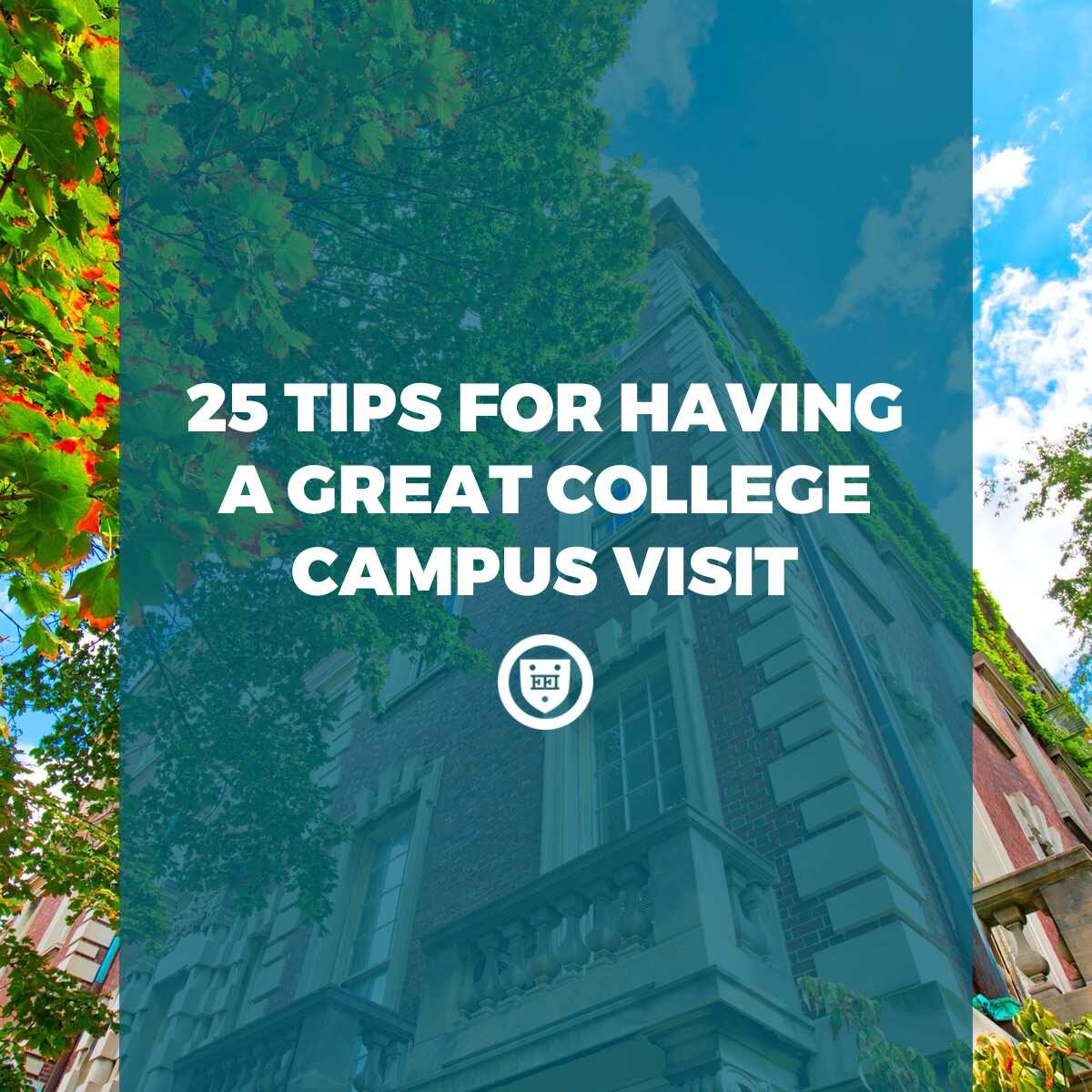
College campus visits are important for prospective college students for a number of reasons. For one, they demonstrate your interest in the schools to which you’re applying. Beyond this, they are useful in helping you and your family make the difficult decision of where you will invest your time, money, and efforts over the next four years of your life.
This is a big decision no doubt. When it comes to college visits, then, it’s no surprise that they can feel overwhelming. So here are 25 tips for how to have a great college visit that is smooth, informative, and even fun.
1. Visit during your junior year
It’s a good idea to visit a college campus or two in the few first years of high school (or even middle school). This can give you a feel early on for what the college experience is like and if it is for you. While this is certainly true, it is generally considered best to do the bulk of your campus visitations during your junior year. This is because much of your senior year will be spent working on actual college applications. So, getting your campus visits out of the way during junior year will leave you with plenty of time and energy to focus on those!
2. First, take virtual tours and/or attend a college fair
Before you even visit a college in person, narrow down your options by taking virtual campus tours online and, if possible, by attending a college fair. Of course, you can’t glean as much information from either of these experiences as you can from an in-person college visit. But you just might learn something about a school from either a virtual tour or college fair that could get it added to or taken off of your short list.
National College Fairs, for example, is a program of the National Association for College Admission Counseling (NACAC). It hosts college fairs across the country every year, including performing and visual arts college fairs, STEM college fairs, and an international universities fair. These fairs are free, and they give students the opportunity to engage with representatives from an array of colleges and universities across the globe.
For a searchable list of this year’s National College Fairs, please see this page from the NACAC website .
3. Go on a practice run
Before you visit the colleges in which you are most interested, start by visiting a school as a sort of practice run. This can be a local school that you feel less invested in or a school that you do not intend on applying to at all. The idea here is that with less at stake, you can get your nerves out in this “dress rehearsal” and then be confident to tackle those schools that are on the top of your list!
4. Visit during the school year
Although colleges might be less crowded over spring or winter break and you might have a bit more freedom to explore, chances are that many campus buildings will be closed during this time and there will be fewer people around. So, be sure to visit college campuses while school is in session—when you can see as much as possible and chat with as many people as possible, really getting a more accurate sense of how that college operates on a daily basis.

5. Sit in on an information session
College information sessions are short presentations run by admissions staff that give general facts about schools to prospective students and their families. These are typically held just before campus tours, and they are a great opportunity to get basic information about a college, including admission requirements, financial aid, and a bit about the undergraduate experience. Depending on the college, registration for these sessions may or may not be required. So, be sure to plan accordingly with each school. And, before you leave, be sure to get the business card of the admissions officer who led your session or (for larger schools) who is responsible for traveling to your local area, just in case you have any follow-up questions after your visit.
6. Take the official tour
Most colleges and universities hold daily tours of their campuses hosted by the admissions office. The guides who lead these tours are primarily current students working off of a script given to them by admissions. This means that they are told which campus sights to highlight and which attributes of the school to emphasize, which is a good thing since you will be sure to see the most iconic places on any given campus during your tour; yet, this doesn’t always mean that what is covered on the tour will necessarily interest you . So, be sure to ask to see locations that are of interest to you. Are you interested in acting classes but haven’t yet been taken by the theater building? Don’t be afraid to ask your guide. Also, don’t be afraid to ask questions that haven’t been addressed on the tour, even if they are more probing than where you can park without getting a ticket or find the best burger on campus. Remember that the purpose of these tours is to sell colleges to prospective students. So, your guide is there to help you in any way they can.
7. Then, take your own unguided tour
While it is important to take the official campus tour, it is also important to leave enough room in your schedule to take an unofficial tour on your own. Did you stop by any places on the guided tour that you wanted to revisit? Did you spot anything on the campus map that the official tour didn’t get to but that looked particularly interesting? Leaving time for your own unguided tour is also a great way to discover the ivy on the staircase of the science building, the view from the philosophy library, or the surprisingly good sandwiches in the student center coffee shop—those smaller and more charming things about a college campus that often make you fall in love with it.
Read More: 6 Ways to Show Genuine Interest in Your Intended College Major
8. talk to as many people as possible.
The most valuable resources when visiting any campus are the people you encounter there. And it’s important that you talk with a variety of these people—from existing students to faculty, staff, and even alumni (if possible). Combined, all of these individuals contribute to the life and vibe of a college campus, so they are all worth communicating with.
With that said, it’s worth noting that you can always walk up to students and other members of the campus community and initiate a conversation with them. But, they might be busy or otherwise unwilling to chat. So, you might consider working with the admissions office, who can connect you with relevant people who are willing to chat in person during your visit or via email/Skype.
9. Visit academic departments
Visit academic departments of which you expect to be a part, especially those you anticipate majoring or minoring in. Professors are typically happy to meet with prospective students. Just remember that they are generally very busy. So, before you arrive, make arrangements to meet with them, as they can provide you with detailed information about their programs, including syllabi from courses you would be required to take or interested in taking.
10. Visit other departments of special interest
In addition to academic departments, also be sure to visit any departments or organizations that are of special interest to you (such as athletic departments or student clubs) and speak to people there (such as athletic directors or club leaders). As with professors, you’ll typically find that most people enjoy meeting with prospective students to discuss their shared interests, so don’t be shy about reaching out to arrange these conversations. Just be sure to do so well enough in advance.
11. Visit a dorm (or two)
While a stop inside a student dorm in typically included on most official campus tours, don’t be afraid to ask to see multiple dorms on your tour, as student housing tends to vary. There is usually a separate dorm for first-year students, for instance. Often times campuses have more apartment-style housing for students in their third and fourth years, as well. Be sure to also check out these housing options for upperclassmen, so that you can know what to expect if you live on campus beyond your first year. And if you plan on living in the surrounding area instead of on campus, be sure to gather information about places for rent and ask students about their experiences with off-campus housing.
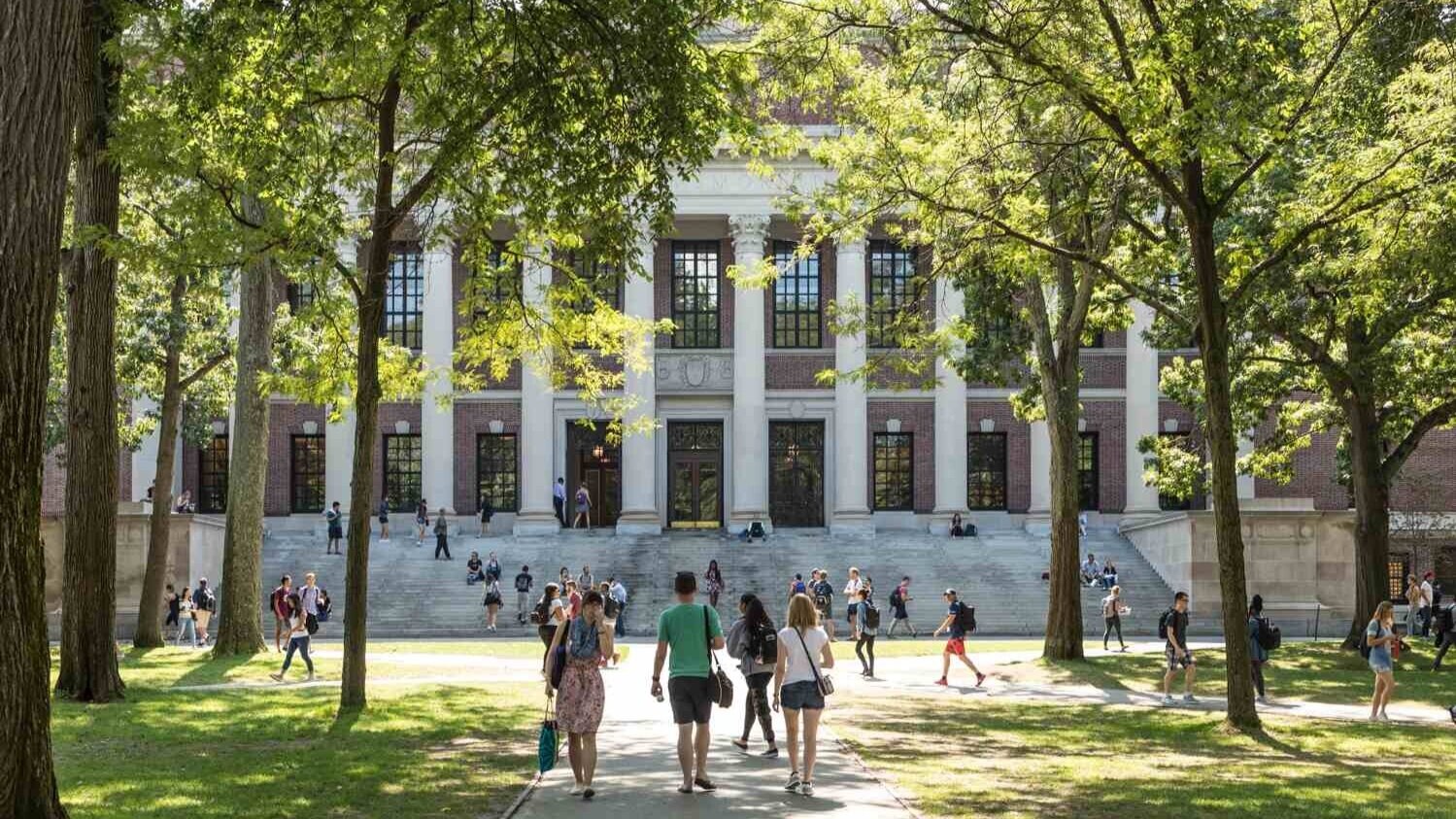
12. Visit other campus buildings you will likely frequent
For better or worse, much of a college student’s time outside of their classrooms and dorm is spent studying in other campus facilities such as the library and student center. While on your visit, be sure to visit these spaces. While in the library, walk through the stacks, check out the communal computer and quiet study areas, and even chat with a librarian—perhaps about the stacks of your intended area of study. While walking through the student center, ask yourself if you can picture yourself there, getting a coffee in the morning or detoxing with friends after a long day. Does it seem inviting and comfortable?
Other buildings/areas of campus you might want to visit include:
The health center
Athletic and/or workout facilities
The book store
The career center
The counseling center
Research labs
The disability resource center
Parking facilities
13. Visit (and eat in!) one or more student dining facilities
One of the great tricks to enjoying college is learning the best places to eat on campus. So, be sure to ask about the preferred dining spots and try them out for yourself. Most colleges typically have at least one cafeteria-style dining hall where you can sit down for a meal, as well as more of a “greasy spoon” style eatery where you can grab a quick bite on the go. If possible, check out one of each. While on your tour, also scope out the vending machine options—both near classroom buildings and student housing. These can come in handy when you need a fast snack between classes or when most dining facilities have closed shop for the night.
14. Get information about campus safety/security
Although it’s a matter of campus life that we tend to consider less, the issue of safety is incredibly important. So, take some time to ask about this issue on your visit. Do all students on campus generally feel safe, even when walking to and from evening classes? Does the campus offer a student shuttle service? What measures does campus security take to enforce safety precautions? Do security personnel or members of local police have a presence on campus/regularly patrol campus?
15. Visit the surrounding area
In a way, when you commit to the University of Alabama, you’re not just committing to the University of Alabama; you’re also committing to the city of Tuscaloosa. When you commit to being a Trojan, you’re also committing to greater Los Angeles. This includes all of the local coffee shops, bookstores, restaurants, theaters, and everything else that each of these areas has to offer. So, be sure to leave some time to not only check out the college campus on your visit but to also check out the city or town in which the college is located, since you will be sure to engage with the life of that place, as well.

16. Meet with a member of both financial aid and admissions
Even if you’ve already sat in on the information session and have gone on the official campus tour, it’s a good idea to meet individually with both a member of the financial aid office and admissions. Finances can present a real barrier to entry for prospective college students, and figuring out how to receive aid in order to make college possible can simply be confusing. So, sitting down with a professional who can explain your options is incredibly beneficial.
And with so many prospective students applying to their institution every season, it’s important to admissions officers that you stand out from the crowd. Taking the time and effort to meet with an admissions officer during your campus visit allows them to put a face to a name once your application rolls in, ideally giving you a leg up from the other applicants in the stack.
17. Spend the night and/or sit in on a class
Many colleges allow you to briefly immerse yourself in the life of their school by spending the night with a current student and sitting in on a class session. While your host isn’t always responsible for entertaining you during your overnight stay, the experience can be a chance to experience the workings of a dorm, often including a communal living space and shared bathrooms. When you sit in on a class, take stock of your fellow students. Do they seem engaged? Also take stock of the classroom. Do the facilities seem up-to-date and well taken care of? Do you otherwise feel comfortable in the space?
18. Keep an eye out for campus literature
While in the admissions office, be sure to check out any available brochures and pamphlets. While these often include general information about a school that can be found on their website, they can be helpful in your college decision-making process since they are portable, handy, and easy to organize with the other college brochures and pamphlets you’ve accumulated. In addition to these, also keep your eyes peeled for pamphlets and other signs posted on bulletin boards across campus advertising upcoming events. And, if possible, get your hands on a copy of the school newspaper. What is the tone of this literature? Do the activities they boast sound interesting to you? Can you picture yourself taking part in them?
Read More: What High School Juniors Should Be Doing to Prepare for College
19. don’t let the weather rain on your parade.
Remember that once you’re enrolled at a school, you will be there relatively year-round, experiencing it in all the weather that area has to offer. So, if you happen to be taking your campus tour on a rainy day, be sure to do your best to not let it dampen your view of that school. Try to imagine what the campus will look like on a beautiful spring or summer day as well, with students taking in the sun and playing Frisbee on the quad.
20. Try to read the school’s vibe
As you walk around campus on your tour, do a good amount of people watching. How does the student body strike you? How do they seem to interact with one another? Is it what you envision when you dream about going to college? For instance, if the student body appears to lack diversity and you believe that you would thrive in a more diverse environment, this might not be the school for you. Or, if there hardly seems to be anyone on campus, and you know you would thrive in a more vibrant setting, this might not be the school for you either. Just think: Can you see yourself happily fitting in among these people and this environment?
21. Come prepared with questions
It can feel like a lot is being thrown at you at once during a college campus visit, and it can be easy in the moment to forget questions you want to ask. So, come prepared with questions either printed out or typed on the notes app of your phone. Have questions for everyone you’ll encounter, not just admission staff or your tour guide. And divide your questions into useful categories (such as by person or subject) so that they are more easily accessible as you make your way through the day.
Remember, too, to not get too bogged down with questions regarding logistics during your visit (e.g. the size of the student body, the typical class size, etc.). You can typically locate the answers to such questions on a college’s website or in their brochures. Instead, try to ask more questions about less tangible but no less important aspects of the college experience. A few such questions include:
What makes your school unique?
How would you describe the student body?
What sort of student would most thrive here/would not be happy here?
What’s something you wish you had known about this campus before coming here?
Does the college work to prepare its students for a career after study?
Do the professors seem happy here?
How do locals feel about the students here?
For a list of more questions to ask on a college visit, check out our article on 14 Insightful Questions to Ask College Admissions Officers .
22. Keep an open mind
While you may already have feelings about a certain college for one reason or another (e.g. your big sister went there, your favorite basketball player went there, or you’ve always heard about it in movies or on the news), try to walk into your campus visit without any preconceived notions—whether they be good or bad. Try to participate in all possible activities during your visit, even if they might be a bit out of your comfort zone or if you only guess they’ll be relevant to your future college experience. In the end, the more information you have about each school, the better decision you’ll be able to make about where you’ll attend college.
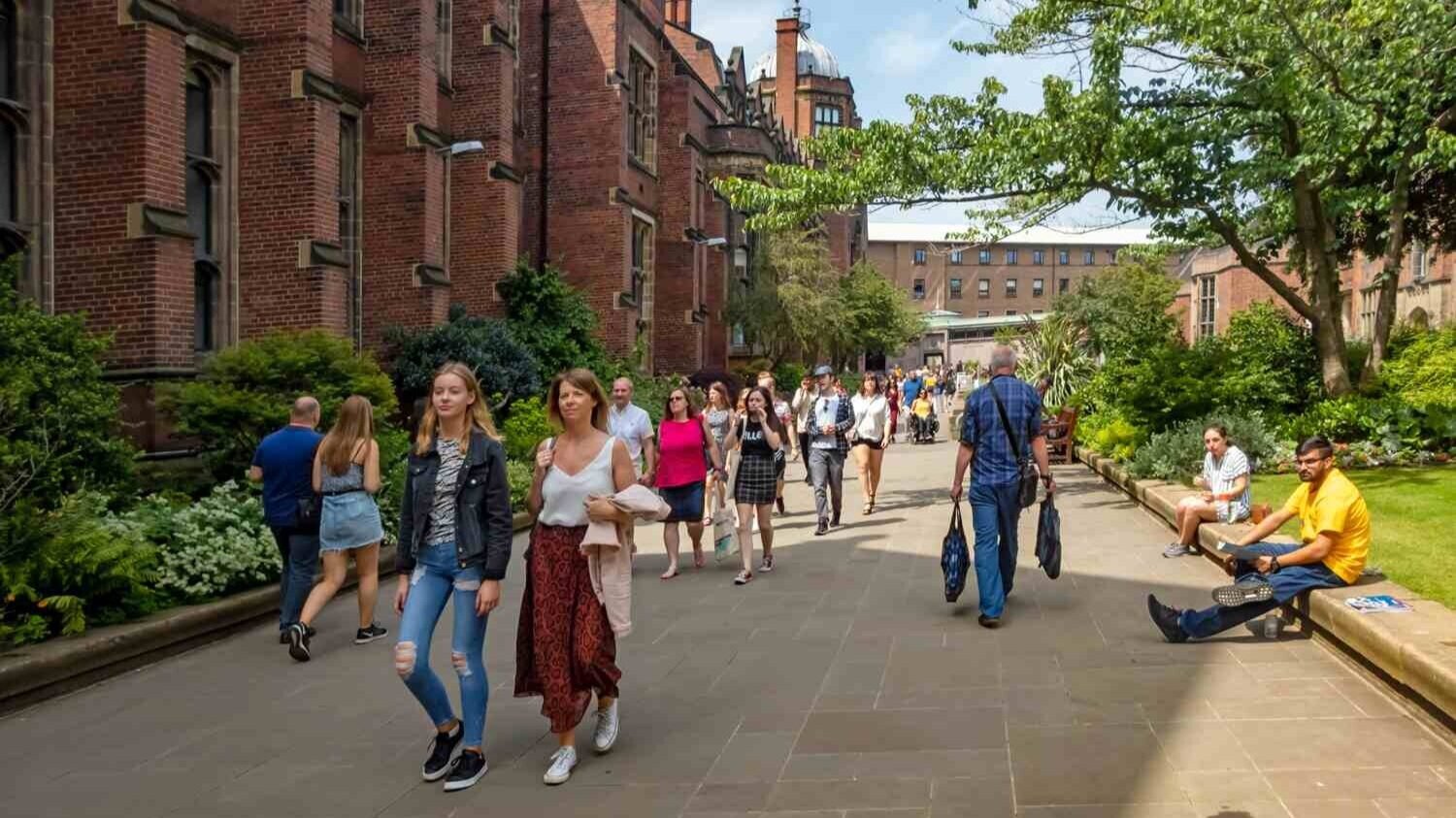
23. Take plenty of notes and photos
Don’t trust your campus visit to memory. Especially when you’re visiting multiple colleges, the information you’ve taken in can blend together. So, be sure to take notes about your impressions of each school. And take plenty of photos, as well—including selfies. Just think of how cool it will be to have a throwback photo of your first time visiting your alma mater!
For help with keeping notes during multiple college campus visits, check out this “College Comparison Worksheet” (PDF) from the NACAC website .
24. Follow up
Your college visit doesn’t end when you drive away from campus. An important step in the process is following up with the people with whom you met during your time on campus, especially professors and staff. These communications don’t have to be formal. In fact, emails are best since they are easiest to respond to. When drafting your follow-up emails, simply thank these individuals for their time and express that you had a positive experience during your visit. Another tip is to mention something specific from your visit (e.g. something you saw, did, or discussed together) to personalize your note and show how much you care.
Another important step post-campus visit involves looking back at your notes and photos; writing down any follow-up questions you might have; and discussing your impressions with family, friends, and trusted mentors. What are your thoughts after this reflection?
25. Enjoy yourself
Last (but certainly not least), remember to enjoy yourself while visiting college campuses. Of course, this is, in part, just a state of mind. But there are also practical steps that you can take to ensure that the campus visit experience is a pleasurable one. First, don’t try to fit in too many campus visits or even too much of one campus visit in on a single day. Also, perhaps leave some time for something fun while visiting a college, such as a nearby tourist attraction. And regardless of your itinerary, be sure to plan your campus visit reasonably well ahead of time to alleviate any stress that comes from being in a time-crunch.
Finally, remember that while choosing a college is a big decision, it is an exciting one that typically only comes once in a lifetime. So, be excited about the process!
Stacy G. is a writer and teacher who has taught composition, literature, and creative writing courses at a number of public and private universities across the U.S. She has also taught SAT, AP English, and Literature SAT Subject Test courses at Elite Prep. She likes poetry, dogs, and poetry about dogs.
Login or sign up to be automatically entered into our next $10,000 scholarship giveaway
Get Started
- College Search
- College Search Map
- Graduate Programs
- Featured Colleges
- Scholarship Search
- Lists & Rankings
- User Resources
Articles & Advice
- All Categories
- Ask the Experts
- Campus Visits
- Catholic Colleges and Universities
- Christian Colleges and Universities
- College Admission
- College Athletics
- College Diversity
- Counselors and Consultants
- Education and Teaching
- Financial Aid
- Graduate School
- Health and Medicine
- International Students
- Internships and Careers
- Majors and Academics
- Performing and Visual Arts
- Public Colleges and Universities
- Science and Engineering
- Student Life
- Transfer Students
- Why CollegeXpress
- $10,000 Scholarship
- CollegeXpress Store
- Corporate Website
- Terms of Use
- Privacy Policy
- CA and EU Privacy Policy
Articles & Advice > Campus Visits > Articles

College Visits: How to Prepare to Take Tours and Explore Campus
Campus visits are vital when considering what colleges to apply to. Whether you go in person or explore online tours, these tips can help you get there.
by Mary E. Chase Associate Vice President of Enrollment Management, Creighton University
Last Updated: May 3, 2024
Originally Posted: Feb 6, 2012
The campus visit is one of the most, if not the most, important steps you can take when considering what college to attend. The campus visit will give you a firsthand view of the school’s size and layout, the types of students it attracts, and where you will be living, learning, and enjoying the next several years of your life.
Visit well before applications are due
Physically visiting a college campus is the best way to get a feel for the campus culture and community. You should visit the colleges you're interested in well before applications are due. It’s also preferable to go when classes are in session and day-to-day activities are taking place; this will give you the most accurate sense of what it will really be like living on that campus. It isn’t likely you will spend your college career within the confines of campus—you will want to explore the surrounding community too! Between social events and work opportunities , you will spend plenty of time off campus and potentially live off campus at some point as well. Understanding how you might travel to and from the college is an important factor to consider if you are commuting or traveling a distance to attend. Many students want to go to a school far from home. This may seem appealing until you give serious thought to all that is involved in traveling to and from campus—from airfare to handling family emergencies.
Related: 5 College Visit Tips No One Told You About Until Now
Prepare yourself and your questions
Prior to visiting any campus, you should develop a list of questions for various audiences. You want a series of fact-finding questions for admission officers; these should focus on the application process, evaluation criteria, and important deadlines. Don’t waste your time asking about the average class size or other facts you can find in brochures or on the Web. Prepare questions to ask the assigned tour guide and then ask those same questions of random students you encounter on campus—you should get an interesting variety of perspectives on the quality of student life and social opportunities. Finally, have some questions for academic advisors or faculty members. Even if you are not certain about your major or interests, inquire about the support you will receive in discerning your academic path.
Hit the campus hot spots
Once you arrive on campus, stroll around the quad, meet with an admission representative , take a tour of the residence halls, and sit in on a class if you can. It is also strongly recommended that you eat in the dining halls. Not only can you observe the quality and variety of food, but you will also have the opportunity to eavesdrop on the types of casual conversations among current students. (Not in an intrusive way, of course!) As affordability becomes more and more relevant to the college selection process, it is a good idea to discuss scholarships and financial aid during your visits as well. Meeting with someone from the financial aid office is not always an option, but be sure to ask about the process when meeting with the admission representative. Remember, the practice of awarding scholarships and need-based aid is inconsistent from one school to the next, and families are often unable to evaluate the true cost of attendance until only months prior to enrollment. When visiting campus, have realistic expectations and focus on finding out how to navigate the process of applying for and receiving scholarships and financial aid.
The career center may not be an obvious stop during your visit, but it’s highly recommended. When there, you want to learn more than placement rates. Ask about career services available to students throughout their college years and beyond. Most schools help students build résumés and complete graduate school applications, but you should also inquire about campus interviews, networking opportunities, and internship placement. With a competitive job market and limited graduate school space, you will want to know what type of support you will receive.
Related: An Important Checklist to Plan Your First Official College Visits
Take notes and pictures or even go back
It is a good idea to take photos during your campus visits as well. As you journey toward a final decision, having a visual aid, along with some notes taken during campus interviews, can help. It might be helpful to shoot some video on your phone if possible too. It is always a good idea to pick up the campus newspaper and read the editorials to better understand what is on current students’ minds. When feasible, you should consider visiting college campuses early in your college selection process and then again when you are finalizing your plans. You will be amazed by the different questions you have and the campus characteristics that become meaningful during the various stages of your decision-making process. Visiting a college campus two or three times prior to your enrollment is not a bad thing. You will have a better understanding of what to expect, and you will likely learn something new each time you visit.
Explore online options
In the event you are unable to physically visit a campus, you should see what is available online for viewing. Not all colleges have a good virtual tour, so you might have to do a little surfing. Again, reading the school newspaper online is a good way to see what is happening on campus. You can also learn a lot by looking at the school’s webpages devoted to campus activities, student government, housing, dining services, athletics, libraries, academic success, and even health and wellness. Keep in mind, you would spend a minimum of three to four hours if you physically visited a campus, so don’t click too quickly when taking a virtual tour . Take your time and enjoy learning about where you might be spending the next four years.
Final advice
Here are a few things to remember when visiting a college:
- There are no dumb questions as long as the subject matter is important to you in the college decision-making process.
- Not every college is as it appears online or in the publications you find in your mailbox.
- Everyone is looking for something different in a college. Ask to see and hear about things that are important to you.
- Although it is difficult at times to distinguish one school from another, try to identify why each campus you visit is unique.
- Focus on what is in front of you and save comparisons for later. You can build a matrix of pros and cons after you have toured the campuses you wish to consider.
- Be grateful for the time of the people you meet when touring. Send a thank-you note, or—bare minimum—express your appreciation after meeting with each person.
- Talk with other visiting students, but don’t let their opinions influence you in your decision. You may never see that person again!
- Visiting multiple colleges in a short period of time can be risky. Be sure you have time to give thoughtful consideration to what each campus has to offer.
Related: 3 Good Alternative Options for Canceled Campus Tours
Choosing a college is a big decision, probably the biggest one you can make at this moment in your life. Be certain to include your mentors and family in the process. This includes asking at least one person to accompany you while visiting a campus. Having someone to discuss what you saw and heard during the visit will help in that ultimate college decision.
Check out the Campus Visits section for even more great advice for planning and attending college visits!
Like what you’re reading?
Join the CollegeXpress community! Create a free account and we’ll notify you about new articles, scholarship deadlines, and more.
Tags: campus visits college visits online tours virtual campus tours virtual tours virtual visits
Join our community of over 5 million students!
CollegeXpress has everything you need to simplify your college search, get connected to schools, and find your perfect fit.

High School Class of 2019
CollegeXpress has helped me by opening my eyes to new opportunities. I learned about such easy ways to get financial help to achieve my dreams while also learning about myself and who I truly am. I know this isn't a very long explanation of what CollegeXpress has done for me, but nonetheless, I believe it's crucial to how I developed as a person throughout my time as a college student.

Emilie Delgado
$2,000 Community Service Scholarship Winner, 2013
CollegeXpress has tremendously helped me in my search for financial aid opportunities as I enter my college career. It is easy to navigate and quickly narrowed down scholarships that I could apply for. Being awarded the scholarship will greatly help me in my finances regarding books and tuition. Thank you for this opportunity. Without CollegeXpress, it would have been more difficult to apply. I would recommend this site to everyone!

Jessica Rinker
Student, Fairhaven High School; CollegeXpress Student Writer
My high school counselor introduced me to CollegeXpress freshman year. It has made such a difference in high school, and I plan to continue relying on it in college. CollegeXpress is my go-to because it addresses each aspect of being a student. There are the articles you’d expect regarding college applications and financial aid, but you will also find advice on things like de-stressing and maintaining relationships while balancing a heavy course load. CollegeXpress will also keep you updated on current scholarships through e-mails each Saturday. (They don’t harass you with any product promotion like so many other sites do.) CollegeXpress is a lot like an older sibling who has already conquered the challenges you are facing. Now, they are reaching out a helpful hand. I say take it.
High School Class of 2022
My mother signed me up for a couple of scholarship contests through CollegeXpress. I was also able to do some research and compare the different schools on my list. I was able to see the graduation rates and different programs that helped me decide on Adelphi University. I will continue looking for some scholarships for my start in September.

Lexie Knutson
High School Class of 2021
This whole website has helped me overcome the attitude I had before. I was scared to even approach the thought of college because it was so much. I knew it wasn’t just a few easy steps, and I panicked mostly, instead of actually trying. Without realizing it, CollegeXpress did exactly what I usually do when I panic, which is take it one step at a time. With college I forget that because it’s more than just a small to-do list, but this website was really helpful and overall amazing. So thank you!
- Great Colleges and Universities If You Want to Live in the Big City
- Great Colleges If You Want to Live by the Water
- Great Colleges If You Want to Live in the Mountains
- Great Colleges If You Want to Live by the Beach
- Campus Visits: The Best Resource to Use in Your College Search
Colleges You May Be Interested In
Christian Brothers University
Memphis, TN
Waynesburg University
Waynesburg, PA
University of Cincinnati
Cincinnati, OH
Vermont State University
Randolph Center, VT
Bridgewater College
Bridgewater, VA
Personalize your experience on CollegeXpress.
With this information, we'll display content relevant to your interests. By subscribing, you agree to receive CollegeXpress emails and to make your information available to colleges, scholarship programs, and other companies that have relevant/related offers.
Already have an account?
Log in to be directly connected to
Not a CollegeXpress user?
Don't want to register.
Provide your information below to connect with
US South Carolina
Recently viewed courses
Recently viewed.
Find Your Dream School
This site uses various technologies, as described in our Privacy Policy, for personalization, measuring website use/performance, and targeted advertising, which may include storing and sharing information about your site visit with third parties. By continuing to use this website you consent to our Privacy Policy and Terms of Use .
COVID-19 Update: To help students through this crisis, The Princeton Review will continue our "Enroll with Confidence" refund policies. For full details, please click here.
Enter your email to unlock an extra $25 off an SAT or ACT program!
By submitting my email address. i certify that i am 13 years of age or older, agree to recieve marketing email messages from the princeton review, and agree to terms of use., get the most out of your college visits.
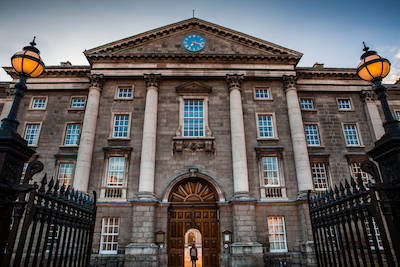
College visits are probably the most fun part of the college application process . When it comes to researching potential schools, there’s no better substitute for figuring out if a campus will feel like home.
If possible, visit every college that you are strongly considering. No website, guidebook, or testimonial will give you a better feel for a school than you'll get by seeing it for yourself. Many students change their minds after a campus visit. This is obviously preferable to changing your mind after you enroll! Get the most out of your time on campus with our college visit checklist:
1. Mind the calendar.
Schedule your visit while school is in session. You won't get a realistic idea of student life in August (or if you attend during a special event like Spring Fling).
2. Meet the experts.
Talk to the current students—they may soon be your peers. If they have a problem or complaint, they will probably share it with you. If they love their school, they won't be shy about it either. Come prepared with some questions to ask—specific ones will get you more interesting (and helpful) answers.
3. Meet the other experts.
Stop by the admissions office and introduce yourself. Let them know what interests you about the school so they can direct you to the best place for further investigation. Collect contact information and send a brief, friendly e-mail thanking them for taking the time to talk to you.
If there is a sign–up sheet, add your name! Colleges do keep track of which applicants have demonstrated genuine interest in the school. A visit is a great way to demonstrate your interest.
Read More: 6 Quick Tips for Contacting Colleges
Some schools will let you interview with an admissions rep during your campus visit. If this opportunity is available, don't pass it up.
4. Take the campus tour…
While it's the most obvious thing to do, the official campus tour is worth your while. (Find out if you need to register to get a spot.) It gives the school a chance to show off its best features, like the newly-built theater or their rooftop planetarium. While you're walking around, check out the flyers and bulletin boards and pick up a school newspaper to get a sense of what's going on.
5. …then venture out on your own.
The official tour will probably steer you clear of the school's less attractive features, like the shoddy dining hall or the tiny gymnasium. Take your own un-official tour by wandering around campus. If there are any facilities that are important to you, find them and have a look for yourself. Make sure your destinations include the library and the first-year dorms .
6. Be a student for a day (or night).
Some schools sponsor overnight programs in which you can stay with a current student. This is a great opportunity to get a deeper sense of campus life and interact with your potential future friends and roommates.
Even if you don't stay over, most schools will allow you to sit in on lectures. Browse the course catalogue before you arrive, or ask the admissions office what classes are in session that day.
Read More: College Search Tool
7. Save the best for last.
You'll get better at visiting colleges with practice. As you compare schools, you pick up on the aspects you like and the aspects you're not so fond of. You also figure out the right questions to ask, as well as the best campus spots to gauge student life. For that reason, visit your favorite schools last, so you'll be in the best position to make comparisons to the others on your list.
8. Keep a record of every college visit.
If you visit many schools, your memories of them are bound to overlap. Use a note-taking or voice-recording app on your phone, or plain old notebook and pen, to keep track of the details you like and the stuff that you don't like. When more questions arise (as they most definitely will), you can fire off an email for an answer rather than visiting a second time.
9. Don't rush to judgment.
Try not to base your opinion of a school on bad weather or one boring class. There are bound to be sunny days and more interesting classes. Same goes for overnight visits—you might end up staying with a student who has very different interests than you do.
At the same time, trust your gut. Sometimes it's love at first sight. Other times, something feels wrong (even if you can't put your finger on it).
Looking for strategic college advice?
Get one-on-one help from former Ivy League and top tier admission officers. Our College Counselors will help you find, apply, and get accepted to your dream school.

Explore Colleges For You
Connect with our featured colleges to find schools that both match your interests and are looking for students like you.

Career Quiz
Take our short quiz to learn which is the right career for you.

Get Started on Athletic Scholarships & Recruiting!
Join athletes who were discovered, recruited & often received scholarships after connecting with NCSA's 42,000 strong network of coaches.

Best 389 Colleges
165,000 students rate everything from their professors to their campus social scene.
SAT Prep Courses
1400+ course, act prep courses, free sat practice test & events, 1-800-2review, free digital sat prep try our self-paced plus program - for free, get a 14 day trial.

Free MCAT Practice Test
I already know my score.


MCAT Self-Paced 14-Day Free Trial

Enrollment Advisor
1-800-2REVIEW (800-273-8439) ext. 1
1-877-LEARN-30
Mon-Fri 9AM-10PM ET
Sat-Sun 9AM-8PM ET
Student Support
1-800-2REVIEW (800-273-8439) ext. 2
Mon-Fri 9AM-9PM ET
Sat-Sun 8:30AM-5PM ET
Partnerships
- Teach or Tutor for Us
College Readiness
International
Advertising
Affiliate/Other
- Enrollment Terms & Conditions
- Accessibility
- Cigna Medical Transparency in Coverage
Register Book
Local Offices: Mon-Fri 9AM-6PM
- SAT Subject Tests
Academic Subjects
- Social Studies
Find the Right College
- College Rankings
- College Advice
- Applying to College
- Financial Aid
School & District Partnerships
- Professional Development
- Advice Articles
- Private Tutoring
- Mobile Apps
- Local Offices
- International Offices
- Work for Us
- Affiliate Program
- Partner with Us
- Advertise with Us
- International Partnerships
- Our Guarantees
- Accessibility – Canada
Privacy Policy | CA Privacy Notice | Do Not Sell or Share My Personal Information | Your Opt-Out Rights | Terms of Use | Site Map
©2024 TPR Education IP Holdings, LLC. All Rights Reserved. The Princeton Review is not affiliated with Princeton University
TPR Education, LLC (doing business as “The Princeton Review”) is controlled by Primavera Holdings Limited, a firm owned by Chinese nationals with a principal place of business in Hong Kong, China.
32 Questions to Ask on a College Visit
Students should feel free to ask questions during an information session or on tour.
Questions to Ask on a College Visit

Getty Images
Prospective students should conduct at least basic research to facilitate questions to ask during the information session or on tour, experts say.
Key Takeaways
- Before a campus visit, students should do basic research on the school.
- Students and their families have various opportunities to ask questions.
- No question is dumb.
College visits, whether in person or virtual, can help give prospective students a better feel of campus life.
Contrary to popular belief, however, students don’t need to have that “a-ha” moment when they eventually find the campus where they belong, says Thyra Briggs, vice president for admission and financial aid at Harvey Mudd College in California.
“I just don't think that happens for most students,” she says. “I don't want students to walk away from a visit where that didn't happen thinking, ‘Oh, this is not the place for me.’ This is a long-term relationship. It's not necessarily love at first sight. … In this age of instant gratification, I think it's an important thing to give a school a chance to affect you in a different way.”
For an in-person visit, families should prepare ahead of time by checking the weather and dressing comfortably as tours are mostly held outside.
"Leave plenty of time at an individual campus and allow yourself to enjoy the experience, be present in the moment and (don't) feel rushed because that could also skew your perception of things," says Bryan Gross, vice president for enrollment management at Hartwick College in New York.
It’s also important, experts say, to conduct at least basic research on the institution – even if it’s just looking at their social media accounts – to help facilitate questions to ask during the information session or on tour.
"We know that for some of you, this may be the first time you are going through this," Briggs says. "For others, it's a different student (going through the process) than the student you had who's older. So there’s no bad questions. ... I would hope that any college would welcome any question a student would ask.”
Here are 32 example questions, collected from college admissions and enrollment professions, that students don't always think to ask on college visits. These questions – edited for length or clarity – were provided by Briggs, Gross and Brian Lindeman, assistant vice president of admissions and financial aid at Macalester College in Minnesota.
Questions About Admissions
- Does this school consider demonstrated interest?
- Is there an opportunity for prospective students to sit in on a class to experience a real lecture?
- Are there options to receive a lunch or dinner pass at the dining hall to try the food?
Questions About Academics
- Where do students typically study?
- How does advising work?
- What are the academic strengths of this school?
- What opportunities are there for study abroad and exchange programs?
- If available, are these global programs directly run by this school – where faculty members travel with students – or are these study abroad programs outsourced to a third-party company?
- Are these study abroad experiences built into the tuition or are there additional fees to participate?
Questions About Financial Aid
- What is this school's average financial aid package?
- What is the average net cost when students enroll?
- What is the current level of funding with endowed scholarships – how much are donors contributing to scholarships?
- Do you offer merit aid ? If so, what are you looking for in a candidate?
Questions About Campus Housing and Community
- What are the housing options?
- What are the fee structures for these different options?
- Are students required to live on campus ?
- How does your campus define diversity, equity, inclusion and belonging?
Questions to Ask Your Tour Guide to Gauge Campus Life
- What surprised you about this school? What's something you didn't expect?
- What keeps you coming back to this school each year?
- Have we seen your favorite place on campus?
- What event on campus gets the biggest turnout every year?
- If you were struggling with an issue, would you know who to turn to? Who would that be?
Questions About Work and Research Opportunities
- What are the opportunities for undergraduate research on campus?
- How do those research opportunities give students valuable hands-on experiences that enhance their resumes?
- What are some specific ways this school helps students gain hands-on experience through internships ?
Questions About Student and Career Outcomes
- What is the retention rate from freshman to sophomore year?
- What is the five-year graduation rate?
- What is the job-attainment rate of graduates within six months of graduating?
- What percent of students are going on to graduate school ?
- What percent of students are intentionally taking time off post-graduation compared to those who are not able to find jobs?
- What size is the alumni network?
- How are alumni actively engaging with recent graduates to help connect them specifically to opportunities in their fields?
Searching for a college? Get our complete rankings of Best Colleges.
Unique College Campus Visits

Tags: colleges , education , campus life , college applications , students
Ask an Alum: Making the Most Out of College
You May Also Like
Universities, the police and protests.
John J. Sloan III May 2, 2024

Biden Condemns Unrest on Campuses
Aneeta Mathur-Ashton May 2, 2024

How to Find a Mentor in College
Sarah Wood May 2, 2024

20 Beautiful College Campuses
Cole Claybourn May 1, 2024

Congress Comes Down on Campus Protests
Aneeta Mathur-Ashton May 1, 2024

University Leaders in Their Own Words
Laura Mannweiler May 1, 2024

Nationwide Campus Protests Escalate
Laura Mannweiler April 30, 2024

Best Colleges Surveys Are Out
Eric Brooks April 30, 2024

Columbia Gives Ultimatum to Protesters
Lauren Camera April 29, 2024

Photos: Pro-Palestinian Student Protests
Aneeta Mathur-Ashton and Avi Gupta April 26, 2024


How To Schedule A College Visit And Make The Most Of Your Time There
Once you've decided which colleges you'll be visiting with your student, it's time to schedule the visit. Here are a few things you should do before you head out on your big trip to be sure you're making the most of the time you have there:
1. SCHEDULE A TOUR—AND MORE.
Here's the general how-to on scheduling your college tour.
1. Go to the college’s website, and click on the "Admissions" tab.
2. If it's a university where graduate programs are option, be sure to go to undergraduate admissions.
3. Click on the "Visit" or "Visiting Campus" tab.
4. Choose the right option for your visit—e.g., Daily Visit, Weekend Visit (if offered).
5. Check the calendar for an available day that you can attend, and click on the day.
6. Fill out the required information—e.g., name, address, school and graduation year, academic interests, etc.
7. If you have the time, sign up for everything else they offer, including a class visit, specific majors information sessions, lunch, a meeting with a professor or coach, and more.
8. Click "Submit"!
9. Check for a confirmation email. If you don’t receive one within 24 hours, make sure to contact the admissions department to check that your request was received.
If you're only able to sign up for a tour, call the admissions office to ask if there's anything else available. You're probably only visiting each school once, so you want to pack in as much as possible. Ideally, your student will be able to observe a class, meet with either a student or a professor (or both!), and chat with the admissions representative for your area of the country.
You should plan on an information session at each school. Often, the information session is part of the tour, but if it's not, be sure to sign up separately. It's generally led by an admissions staff member, and it's a great chance to learn about the school’s application and financial aid processes.
2. MAKE A LIST OF WHAT'S IMPORTANT.
The things we just mentioned—tour, information session, meetings—are core to every student's college visit. But it's also important to personalize your time at the school.
Does your student intend to major in chemistry or English? Plan to check out a chem lab or the writing center. Do they want to try out for the swim team? Visit the school’s pool. Are they thinking about joining the school's volunteer organization? Attend a meeting. You can find information about facilities, organizations, and personnel on the school's website, so do your research and make a list of things you know you want to do on campus.
3. CONSIDER A VIRTUAL PRE-TOUR.
Sites like Campus Tours provide virtual tours of hundreds of colleges and universities. These are by no means substitutes for actual college tours, but they can highlight specific campus attractions and help you plan your trip. For example, you might see a sculpture garden with outdoor workspace you didn't know existed and decide to explore it as part of your visit.
Check out our post on
6 Questions To Ask Others + 3 Questions To Ask Yourself On Every College Tour
< Older Post
Newer Post >

This page is licensed under Creative Commons under Attribution 4.0 International . Anyone can share content from this page, with attribution and link to College MatchPoint requested.
" College MatchPoint helps steer and advise you from beginning to end of the college search and application process. They take what can be a very stressful time and break it down into smaller, manageable pieces. Bob, Lisa and their staff support their student clients, enabling them to find the best fit. You can trust that the process will work; it did for all 3 of my very different kids. "
— Ellen Miura
Sign up with your email address to receive news and updates.
Email signup
OUR SERVICES
OUR APPROACH
ALL RIGHTS RESERVED | COLLEGE MATCHPOINT | SITE BY FIX8

How to Plan & Prepare for Your College Visit
When you think about where you want to go to college, you’ll want to consider what it will be like to actually spend your time there, day by day. Does it not only offer the program you want, but also the resources to support it? And what about everything outside of the classroom? What other opportunities are available? Are you comfortable with the social environment, and can you handle the size of the student body? The climate?
One of the most helpful ways to answer these questions is to visit the schools you’re considering. Stepping on campus before you attend is a great way to predict what it would be like to step on campus as a student. A college visit can give you a first-hand experience that will ultimately help you narrow down your choices and find the perfect school for you.

Why Should I Go on a College Visit?
A college visit will give you the chance to get an up-close-and-personal preview of what your future experience at a school could look like. Visits typically include an information session and a tour of the campus itself.
Information sessions provide an overview of a college’s academics and culture—its strengths, resources, and what makes it unique. This is the perfect chance for you to ask questions and learn about the history, traditions, and fun facts that are specific to a school. The campus tour is exactly what it sounds like—you will be shown important locations like the dining halls, library, student union, and examples of classrooms and dorm rooms. It’s the time for you to get a glimpse of the culture—class sizes, clubs and organizations, the quality of the facilities, and the general atmosphere of the school.
If you take full advantage of your visit, you’ll be able to leave with a pretty clear idea of what life as a student looks like. College visits also give your family the opportunity to take part in your selection process. Bringing parents, siblings, or extended family along for the ride allows them to gain an understanding of the environment, provide their input, and share in your excitement! It may also help ease some of their own fears and apprehensions about your potential new home.
A Comprehensive Guide to Making the Most of Your College Visit
Step 1: decide which schools to visit.
Although they’re helpful, college tours can be expensive and time consuming. You might want to narrow down your options if you have a lot of schools on your list of options. Do some research and try to figure out which colleges have the greatest potential of meeting your needs. Much of the academic information you need can usually be found on the college’s official website, but you may want to explore other resources as well. Consider the location, size, cost, and academic programs of each school, then compare all the options on your list and see which ones are worth traveling to.
Questions that you may want to ask:
- Does this college provide the program I may want to study?
- It’s crucial to find a college that offers high-quality programs for your major .
- What’s the likelihood that I will be accepted into this school ?
- If you know this college is a big stretch for you, you will have to decide whether the expense of a visit would be worth it.
- Am I comfortable with the size of this campus?
- Though it definitely varies by school, smaller colleges may provide more one-on-one interactions with the professors and a tight-knit community, while larger colleges may provide more choices of majors, activities, and other opportunities than those with fewer students.
- Where is the college located?
- Do you want to be able to drive home on the weekends, or would you rather stay in a unique environment far from home?
- Do you want to experience an urban environment, or a small, “college-town” life?
- How does climate factor into your decision?
- How much is tuition?
- If you are accepted into a school, the next question to ask is whether you can afford to enroll! This factor can also vary depending on the location of the college; going to a school out of your home state can affect the price of tuition.
- What kind of financial aid can I leverage at this school?
- Although tuition cost may be an issue, you may be able to rationalize the cost with the help of financial aid. Look into your options and determine whether tuition, room, and board will fit within your budget. For more ways to make attending the school of your choice more affordable, check out these guides:
- How to Find—and Win—Scholarships: Your Complete Guide
- Money Matters: Thinking About Financial Aid
Hopefully, these considerations can help you keep costs low while still benefiting from something as useful as a college visit . And if you want to visit a certain college but are unable to, check its website to see whether it offers a virtual tour. It may not give you the first-hand experience that an actual visit could provide, but a virtual tour is nevertheless a free, convenient way to see the campus from the comfort of their own homes.
More Guides for Conducting Your College Search
Step 2: Make a Reservation
College visits have limited space, so it’s important to make your reservation early. If you have a desired day and time in mind, you should reserve your spot before it fills up and then make your travel plans accordingly. Will you be able to drive, or do you need to book a flight? Will you need to stay overnight? To make your reservation, visit the college’s website and find the page that is dedicated to prospective students. The webpage will be filled with information about planning and reserving a campus tour, which may need to be done through the website, email, or phone.
Step 3: Prepare Questions for your College Visit
You will learn more than you can remember about your potential colleges during your visit, but it’s so important to do your research first and then come up with any questions or concerns you want to resolve while you are there. Just in case the information you want isn’t automatically part of the campus tour, you should have your must-know questions in mind. And, of course, bring along a notebook to keep track of what you learn. Here’s a handful of questions you might be curious about:
- What is the average class size for courses in my major of interest?
- Are most classes lecture based or discussion based?
- What type of career services do you have?
- Do you have a learning community or other freshman experience?
- Do most freshmen live on campus? What about upperclassmen?
- How is parking on campus?
- What is your four-year graduation rate?
- How do students interact with professors outside of class?
- Do you have any advice on ways to get around campus?
- How do you provide academic advice to students?
- What clubs and organizations do you have on campus?
- How soon can I meet with an admissions advisor?
- What and where are the best places to eat on campus?
- What do students typically do in their free time?
- What facilities are available? (gyms, libraries, etc.)
Step 4: Schedule Your Day
Whether you’re staying for a single day or a whole weekend, your college visit will only last for a limited time. To stay efficient and get the most out of your visit, we recommend that you create a schedule of the activities that are important to you. Carve out time to explore the campus on your own or connect with any current students you know; this will help personalize your experience and give you a more in-depth idea of what student life is like.

If possible, you could also consider attending a class, eating at the dining hall, or spending the night on campus—whatever will help you best understand what’s important to you as a student!
Step 5: Find a Map of Campus
A map can help you find specific areas you want to see, such as the buildings where the majority of your classes will take place in a specific major, athletic facilities you will want to use, or different libraries and study centers. It’s also helpful to know the size and layout of the school beforehand (especially if the campus is large!) to make navigation a little easier and faster while you are there.
Finally, take pictures! The more you document your visit, the easier it will be to reference all your likes and dislikes about the campus.
Get Excited
College visits are an important part of the selection process. What better way to understand student life than by living it yourself? Your experience on campus can make or break your decision, so it’s important to be as prepared as possible to learn everything that’s important to you. With a satisfactory college visit, you can leave each prospective college one step closer to your final decision!
More Helpful Guides:
Accepted to Multiple Colleges? Here’s How to Confirm—and Reject—Your Admission
What is College Room & Board?
Who, When, and How to Ask for the Best Letter of Recommendation for College Admissions
High School Checklist: Freshmen through Senior Year
Disclaimer : This article contains affiliate links to products and services. We may receive commissions for purchases made through these links.

The 30 Hardest Colleges to Get Into by Acceptance Rate

Your Guide to Required Documents for College Applications

What is a Target School?
Do you want scholarships and financial aid advice?
Unlock the path to your academic dreams – sign up now for NEW scholarships and timely financial aid advice and stay ahead in the pursuit of higher education!
- Student Life
- SUU Students Page
- SUU Faculty/Staff Page
- Alumni and Community Relations
- Find an Expert
- Marketing Communication Office
- Search the Blog Archives
How To Prepare for a College Visit
Posted: March 01, 2022 | Author: Abbie Cochrane | Read Time: 5 minutes
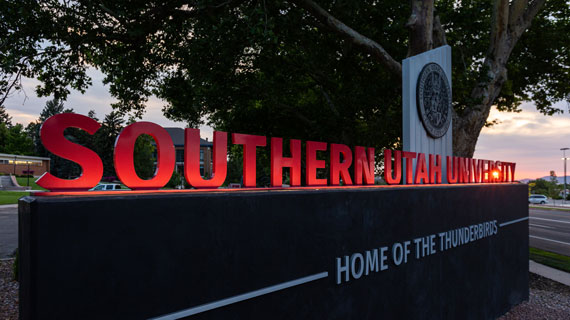
How to Prep for a College Visit
Start planning now.
It’s a good idea to get a jump on signing up for tours before they fill up, and it’s an even better idea to tour colleges from spring to early fall before your senior year of high school so you have a more clear vision of what you are looking for in an institution. However, if you completely space planning a college tour before senior year, don’t despair! There is still time to schedule a tour, but you might just be a little late to the party. And if you don’t feel like touring in-person, there are so many virtual tour options on college websites that you can check out!
Do Your Homework
Before you go check out a university, do some research about it. Think about the kind of college experience you can see yourself thriving in and ask yourself questions like this;
- How big is the campus?
- How many students attend the school?
- Does this university have the desired program or degree I want to pursue?
- Is the location desirable to me?
- Do I want to be able to drive home on the weekends, or live far away?
- Do I want to live in a city or in a small college town?
- What’s the weather like there?
- Does it snow or get really hot?
- If I do get in and choose to go to this school, how much does tuition cost?
- How much financial aid will I receive here? Do they offer scholarships?
- Has it received any awards for exemplary academic achievement or a great program in your area of study?
- What makes this school special and unique?
Another thing to take advantage of is when a representative from a college or university visits your school to talk to students and answer their questions. You can check to see if your desired secondary education institution plans to attend and ask them questions without having to spend the money on a campus tour. College Fair days are especially good for things like this. It’s also a good idea to do a little research about the university’s history as well. Learn about how and why it was founded. What are the school’s values? A school’s motto can say a lot about their vision for their students. You should also read up on the internet or on social media about the university. What do people have to say about their own experiences there? Do you know anyone who went to this college and what questions could you ask them? Does this school sound like somewhere you want to be?
Make A Reservation
As mentioned earlier, campus tours have limited slots, so be sure you don’t just show up. Look up on the website how to schedule a tour and where you sign up.
Prepare Questions
Make a list of questions to ask your tour guide so you can get as much information as you can about the institution. Some questions to ask might include;
- What clubs and organizations/ service opportunities do you offer?
- What’s the average class size in a general education class?
- What about in a class for my major?
- Do most freshmen live on campus?
- Do most upperclassmen live on campus?
- Where can students seek academic advising?
- How and when can I meet with an admissions advisor?
- What are some of the traditions or “freshman experiences” that students can participate in?
- What are the best places to eat on and around campus?
- What activities are there in the community?
- What can students do in their down time?
- Are there any facilities that are for student use (i.e. gym, library, etc.)?
- What’s the average graduation rate?
Other Things to Do on Your Visit
There are lots of things that you can do on your visit besides ask questions. Here are some other things to do on your visit so you can have a better idea of the overall impression that the institution left on you;
- Take pictures to document your visit! Compare what you did and didn’t like.
- Meet professors of your desired department and ask them about the program.
- Check out the dining hall, the student center, or any other popular places that enrolled students frequently visit.
- Ask about campus safety policies.
- Check out housing and dorm options on and around campus.
- See what kind of services and stores are available in the community.
Check out this article about some Effective Tips for College Visit Planning to get more ideas about what to do on your campus visits.
Get Excited!
This is a super exciting time of your life! As overwhelming as it might seem, the more colleges you tour, the faster you’ll be able to decide on one. Your future awaits!
That’s all there is to it! Each campus you visit can help you better define your standards for what you want your college experience to look like. It’s also a great way to figure out what resources are available to you as a potential freshman and the overall environment of the campus. As overwhelming as it sounds, preparing for college visits and exploring each one means you're one step closer to your first semester as a college student.
Tags: Student Life
Your Guide to College Visits
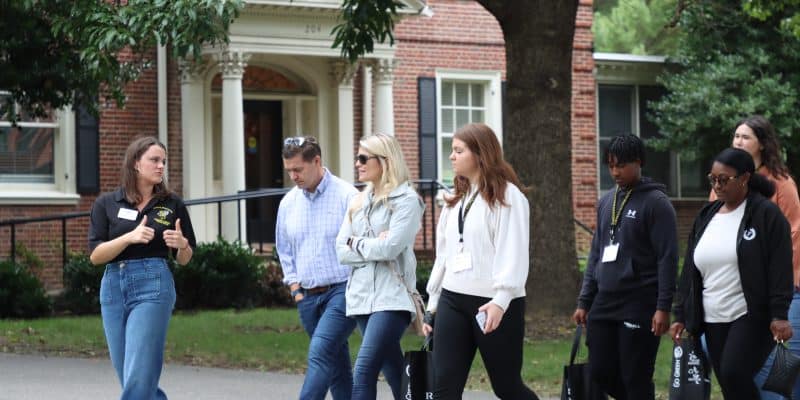
Whether you’re planning an epic cross-country college search road trip, or keeping your hunt local – visiting campuses is one of the most important parts of the college search process. There is no better way to get a real feel for what a school is all about. To help you make the most of your campus tours, we’ve compiled a list of the most common questions our visitors ask.
How should I prepare for a college visit?
Do your homework. Before your visits, familiarize yourself with what each school has to offer. Research academics, campus life, and the application process. Reflect on what makes each institution unique, and how these special characteristics align with your current priorities and future goals. This kind of prep work helps you get intentional about how you spend your time on campus.
What should I ask on a campus visit?
We mean it when we say there are no dumb questions. There are, however, questions that can be easily answered with a quick search on a college’s website. Instead of sticking to the surface, use the time with your tour guide to ask about their unique student experience. Examples of great questions include: What do you love about your favorite professor? How did you meet your best friend on campus? What’s been the most impactful learning experience you’ve had as a student?
Answers to questions like this are sure to offer a perspective that you won’t find on Google!
What does an admissions counselor do? Will I meet them when I visit?
Think of your admissions counselor as your College Search Sensei , of sorts. An admissions counselor is the person who’ll guide you through the ins and outs of the exploration, application, and decision-making phases of this entire process. Because Randolph-Macon thinks this connection is so important, our daily campus visits include a 1:1 meeting with your admissions counselor. Don’t think of this as an interview, or an assessment of your qualifications – but instead, consider it the chance for us to get to know one another a little better. We’ll ask about your interests and future goals, and figure out how Randolph-Macon might fit into those big-picture plans.
How long is a college tour?
This one varies from school to school, but campus visits at Randolph-Macon are about 90 minutes long. Have some extra time to explore? Ask your admissions counselor for restaurant recommendations, take yourself on a walking tour of downtown, visit shops and local attractions. This is your chance to get a feel for life in a new place – take advantage! And if Ashland is on your radar, see what we love most about living in the Center of the Universe.
When is the best time to visit a college campus?
Every student is different, but we find most get serious about campus visits in the spring of junior year or in the summer before senior year. Visiting early will help you narrow your list of college options before applications open in the fall. It’ll also leave space to visit again after you’ve applied and (fingers-crossed!) been accepted. If possible, we recommend at least two visits to your top-pick schools before making the big decision. You’re guaranteed to learn something new each time you’re on campus.
Can parents attend a campus tour?
100% yes! Your parents or guardians will play an important role in this entire process! We encourage you to bring them to your campus visits, and keep them involved in all aspects of your college search.
What if I have a special request?
Hoping to see something super specific while you’re on campus? Don’t hold back – ask for a look! Around here, we recognize that all prospective students have different priorities, passions, and goals. That’s why we’ll work hard to personalize your time on campus, and offer an experience that’s unique to you as an individual. Reach out to us before your visit and tell us what you want to explore – we’re excited to connect you to the people and things that matter most in your college search.
And most importantly, be present . While the college search can sometimes feel overwhelming, it’s also full of excitement and anticipation for what lies ahead. So savor this time and keep an open mind – the place that feels the most like home might be what you least expect.
Related Stories
Letter on fafsa delays from brenda poggendorf, vp for enrollment management.
Here is the latest from Randolph-Macon on FAFSA and financial aid.
Meet the Class of 2027 and Welcome to Fall Transfers
Randolph-Macon welcomed 489 new Yellow Jackets to campus, among the largest cohorts in the College’s history.

Randolph-Macon Announces Brenda Poggendorf as Vice President for Enrollment Management
Randolph-Macon College President Robert R. Lindgren is pleased to announce the appointment of Brenda Porter Poggendorf as the College’s Vice…

How to Prepare for College Visits
Going on college campus visits is an important step toward finding the best college for you. These visits give you a taste of where you might spend the next few years, providing insight into academic life, campus culture, and the surrounding community. Seeing a college in person often makes the college planning process more exciting because you can start envisioning yourself as a college student.
It’s essential to plan ahead to make the most of these experiences — and this planning can begin weeks before you actually set foot on a college campus. This guide will walk you through action steps to take in the weeks and days leading up to your campus visit, as well as tips for making the most of your experience once you arrive.
Long-term Preparation (Weeks in Advance)
Schedule your visit well in advance.
Timing is everything. Ideally, you would like to visit a college campus during the academic semester so you can see what life is like on a daily basis. Visiting during a time when students are away from campus — like spring break or during the summer — may not provide the experience you are hoping for if you want to see a bustling campus filled with students.
Admissions offices also have limited space available for daily information sessions and campus tours, and they can fill up quickly during popular times of the year. Because many high school students have breaks around the same time, certain times of year — like fall break, Thanksgiving, and spring break— are peak seasons for campus visits. Make sure to plan ahead to have enough time to register and secure your spot.
Pro Tip: We recommend official campus visits whenever possible so the college has a record of your visit. Sign up for official campus visits using the student’s personal email address. This is how the college will continue to communicate with you.
Research the College & Surrounding Area
To make the most of your college visit, do some research before you arrive. Visit the college website to learn more about academic offerings or parts of campus life that interest you most. Make a note of anything specific you would like to see on your campus visit or any questions you would like to have answered.
Also, take time to research the surrounding area. A college isn’t just an isolated environment; it's part of a larger community. Spend time on the college's website and use other resources (even maps!) to get familiar with the area around campus. This research can help you understand the college's relationship with its community and identify potential off-campus activities that may interest you.
Tips for Lodging, Dining & Transportation
Figuring out accommodations, meals, and how you will get around are also part of planning a college visit. Look for lodging options near the campus to minimize travel time. Some colleges even offer suggestions or discounts for nearby hotels.
Consider dining options both on and off campus to sample local cuisine and maybe even see current students around town.
You also need to figure out transportation, especially if your family is not driving to the college. If your family is flying, will you need to rent a car? If you are in a more urban area, can you get around using public transportation or ride-share options?
Planning for Multiple Visits
Limit your visits to no more than two schools per day so that you can fully absorb your experiences and avoid fatigue. Carefully plan your route between the campuses, taking travel times into account. This ensures you arrive at each campus relaxed and ready to explore.
Right Before the Visit (Days in Advance)
Finalizing logistics.
Parking and Transportation: Verify parking options and locations in advance. Some campuses are more navigable on foot or by public transport, especially those in urban areas or historic colleges with limited parking. If you will not be parking near the admissions office, give yourself enough time to travel on foot to where your official visit begins.
Weather Considerations: Check the forecast and pack accordingly. Comfortable walking shoes, weather-appropriate clothing, and essentials like water bottles, sunscreen, or umbrellas can make your visit more enjoyable. No one wants to tour a campus with achy, wet feet!
Setting Goals for Your Visit
Before your campus visits, go over your college criteria to revisit which aspects of college life are most important to you. This is a great family discussion to get everyone on the same page ahead of the campus visit!
As a family or on your own, prepare a list of questions that you want answered during your visit. Determine who can best answer these questions (Is it an admissions officer? Your student tour guide?) so you can make sure to seek them out.
Unofficial Visits & Self-Guided Tours
If an official tour isn’t available, don’t feel discouraged. Many colleges offer materials for self-guided tours. These can still be a great way to explore at your own pace.
Before your self-guided tour, reach out to the Office of Admissions to let them know you will be on campus. You can also ask any questions related to your academic interests or any other area of campus life ahead of your visit (I like to ask for a recommendation of what I definitely shouldn’t miss while visiting their campus).
The college may also have recorded information sessions or a virtual tour on their admissions website. Reviewing these materials beforehand — along with your previous research — will help you get the full picture when you set foot on campus.
Regardless of the tour type, be observant! Notice the buildings on campus, the interactions between students, and the overall atmosphere. Take lots of notes and pictures to help you remember your experience when you’ve returned home.
Preparing for a college campus visit involves more than just showing up. With some research, an intentional plan, and clear goals, you can ensure that your campus visit is both enjoyable and informative. Remember to keep an open mind and absorb as much as you can about each campus. This thoughtful approach will help you make an informed decision when it comes time to choose the college that’s right for you!
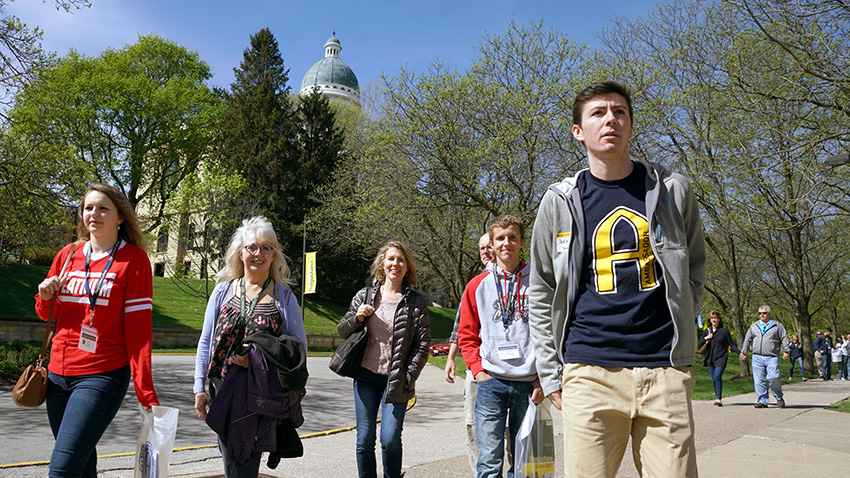
How to prepare for your first college visit

Visiting schools is one of the most integral (and fun) parts of the college selection process. Schools may look great on paper, but the only way to know if the school is the right fit for you is to go and get a feel for campus life.
As an admissions ambassador, prospective students ask me all the time about how to make the most of a college visit. So, today I'm oing to give YOU the rundown on 10 things to consider when planning a college visit!
Do your research
Don't visit a school just because you like the mascot or because your cousin went there. Do some research to make sure they have the program(s) that you're interested in.
It's also good to know some basic facts about the school to get a sense about the number of students who go tehre, the admissions requirements, the geographic location, etc. This way, you won't be caught off guard when you get there.
Kill two birds with one stone
Often visiting a college requires quite a drive. I remember when I visited the University of Kentucky it took SEVEN hours to drive there and my parents and I had to stay overnight in Lexington.
For trips like these, see if any schools you're interested in are close enough to visit in the same trip. You'll save time, money and gas not driving back and forth for multiple visits. Plus, you'll be able to more accurately compare schools since they'll all be fresh in your mind.
Schedule an official visit
The next step is to schedule your visit. A lot of schools will accept walk-ins, but I would highly recommend scheduling an official visit instead. Scheduling an official visit allows you to have a more individualized experience catered specifically to you.
You'll be guaranteed to get a tour of campus and meet an admissions counselor. You can also meet with professors and eat lunch in the dining hall.
You can schedule visits at most schools online or over the phone. Depending on where you are in the search process, you can schedule a group or individual visit at Augustana online.
Come with questions
There's no such thing as a bad question and this is your chance to find out as much as you can about a school. Bring a list of questions that are important to you and be prepared to ask your tour guide and admissions counselor for answers.
Bring something to take notes on
You're going to be inundated with more information than you'll know what to do with. So you might forget a lot of it by the time you get home.
Bring a small notepad, or use notes on your phone, to jot down anything that you think is really important. better yet, write down the answers to the questions you came up with i the previous step.
Note: there's no need to remember miscellaneous info like when the school was founded or how many squirrel statues are hidden on campus (there are twelve at Augustana, for the record). Yes, that information can be fun but it probably won't be one of your deciding factors.
Dress appropriately
Visits involve a lot of walking. So wear comfortable shoes and prepare to get your steps in.
Check the forecast before your visit and make sure you wear something weather-appropriate, and bring an umbrella in case there's rain.
In terms of how much you need to dress up, there's no need to wear anything formal. Just wear whatever is comfortable for you.
Visit a dorm
This is where you might live! Make sure there's enough space for all of your essential belongings, what the roommate and bathroom situation is like and find out how residential life works at each school.
At Augustana, almost all students live on campus until their senior year and there are specific living areas for each class.
Eat lunch in the dining hall
If you’re spending the next four years of your life at this place, you better enjoy the food. Get a taste (pun intended) of their food selection by eating at the dining hall. It’s also a nice way to learn how meal plans work at the college and what food options they have for students.
Talk to at least one student and one professor
It’s important to get the student perspective of things to see what they think of campus and why they chose the school. This is pretty easy to do since your tour guide will most likely be a student.
If you can, also try to talk to a professor too (preferably one in the academic field you want to go into). This’ll give you a sneak peek of the overall learning community at the school and important information about that academic field.
Explore the town
Lastly, before you head back home, feel free to explore the area surrounding the college. Get a sense of what there is to do and maybe hit up some local favorite restaurants and attractions.
If you come to Augustana, I would highly recommend trying Whitey’s Ice Cream (voted as one of the best ice cream places in the ENTIRE WORLD by the Daily Meal) or Harris Pizza (just one of many pizza places which serve Quad Cities style pizza). Both are close to campus and will leave you stuffed (don’t worry, all the calories you burned walking makes up for it).
If you have extra time, check out this list of interest-based itineraries in the Quad Cities to get the best experience.
So there you have it! Now you are well on your way to start visiting colleges (including Augustana) and making the most of the visits.

Justin graduated in 2020, double majoring in biology and neuroscience with a minor in creative writing. He conducted research at Baylor College of Medicine, where he investigated the use of several brain imaging scans to detect early structural and functional differences in young mice with Alzheimer's, with the hope of eventually developing an early diagnostic tool for the disease. He currently is pursuing a Ph.D. in cognitive neuroscience at the University of Kentucky.
- The Ultimate Get-into-College Guide for high school juniors
- 7 must-pack items: a CA's advice for incoming students
Related Content
You’ve been accepted now what.

Why I chose Augustana College

- Online Degree Explore Bachelor’s & Master’s degrees
- MasterTrack™ Earn credit towards a Master’s degree
- University Certificates Advance your career with graduate-level learning
- Top Courses
- Join for Free
How to Prepare For College in 2024: 10 Essential Tips
Learn how you can prepare for college now to help ease the transition and get ready to thrive as you prepare for college in 2024.
![college visit how to prepare [Featured Image] Mother and daughter embrace behind their car which is packed with the daughter's belongings as she prepares to go to college.](https://d3njjcbhbojbot.cloudfront.net/api/utilities/v1/imageproxy/https://images.ctfassets.net/wp1lcwdav1p1/52sIEmWMSUNiBcvIJvrwBU/ab1911e1808748719dd15bd8bcb72657/GettyImages-186479253.jpg?w=1500&h=680&q=60&fit=fill&f=faces&fm=jpg&fl=progressive&auto=format%2Ccompress&dpr=1&w=1000)
Attending college for the first time is an exciting next step in life, and being prepared can make it all that more fulfilling. From honing your skills, like time management and empathy, to challenging yourself with advanced classes and extracurricular activities, you'll discover numerous ways to ensure you're mentally and emotionally ready for some of your life's most unique and exciting years.
This guide contains tips on how to prepare for college in 2024. Let’s explore some of the things you can do now to prepare for your adventures.
How to prepare for college
College is a critical time in a learner’s life. For many people, it's your first adult experience. It's the time when you choose a career, build knowledge, gain skills, and set goals for your professional future. Preparing helps you navigate all the changes for a smoother transition. Start planning now with these 10 tips.
1. Learn how to study properly.
Many students go to college and find that they need to learn how to study correctly or that the way they studied in high school doesn't exactly work in postsecondary education. The sooner you change your study habits, the more ready you’ll be to face college requirements. Changing your study habits in high school may even help improve your academic performance so that you can get into the college of your choice.
Spread it out rather than trying to do it all in one night: Cramming doesn't help you retain material. Spread your study sessions throughout the semester rather than the night before a big test.
Form a study group: Working together with other students in your classes means you can quiz each other and help each other out when necessary.
Take breaks: You can only learn so much at once. Overdoing it can be counterproductive and increase your stress levels. Make time to rest between study sessions.
Practice active studying: Simply reading your textbook or notes is ineffective. Active studying means creating a study guide, explaining the material as if you were teaching the class, or continuously working out problems until you understand exactly why the answer is what it is.
Break away from distractions: Where you study is arguably equally important as how you study. Locate a comfortable spot free of distractions to maximize your ability to focus on the material.
Set a goal and follow through with it: When you start your courses, set a studying goal. It might be something like, "I will study every Monday, Wednesday, and Friday from 5 p.m. until 6:30 p.m."
Treat yourself: When you do meet those goals, reward yourself. For example, if you're in the middle of binge-watching a great show, allow yourself to watch an episode if you meet your study goals for the day.
2. Participate in extracurricular activities.
Universities, colleges, and other learning institutions appreciate seeing extracurricular activities on your application. However, you should choose the ones that truly interest you. Pursue your passions and interests. Get involved with sports or clubs at your school. Volunteer in your community. If you have a hobby or talent that you'd like to explore more, like art, writing, or playing a musical instrument, sign up for classes outside of school or take time to improve upon what you can already do. By choosing the ones you're passionate about, you're likely to stick with them, and they can help build your confidence.
You will also likely build important human skills needed to succeed in college and beyond. For example, you might learn time management skills as you attempt to juggle your academic schedule with your sports practices. Participating in activities can be fun to build communication, collaboration, leadership, and organizational skills. Conducting volunteer work can also help you develop your empathy skills.
3. Start early.
Giving yourself ample time by preparing sooner rather than later helps ease the transition ahead. Some students make the mistake of thinking they have to wait until their final year of high school. In reality, you can start as a first-year learner and spend the next four years making sure you are actively preparing for college.
Early on, start thinking about what you want to study and the schools you want to attend. Doing so can help you determine which classes to take in high school. It can also help motivate you to improve your grades or take more challenging courses as you work toward your goals.
If you're still deciding on the school you want to attend, research all available options. You may prefer an in-state public school or a private school across the country. You may want to major in a unique subject that only a select few schools offer. You or your parents may have a specific budget in mind. Find out which schools meet your needs and visit their campuses to see if they're a good fit.
4. Focus on your organization and time management skills.
Two critical human skills you'll need for college are organization and time management skills. Perfecting them before you begin your postsecondary education may help you improve your courses and prevent stress and burnout.
You may improve your organization and time management skills by:
Writing down important dates and deadlines
Creating and sticking to a routine
Setting daily or weekly goals
Asking for help from others when necessary
Making use of productivity apps
Removing unnecessary distractions from your life
Making checklists
Keeping separate folders for each class
Taking breaks and finding balance to avoid stress and burnout
5. Come up with a financial plan.
College is expensive. In addition to tuition, you'll need books and other materials, and unless you're staying home with your parents, you'll need a place to stay, food, transportation, and more. Start looking into scholarships or financial aid. Knowing how you'll pay for it before you actually enroll is a good way to prepare for college.
In addition, understanding how to manage money is essential for entering adult life. Consider taking a money management course or a class that teaches you how to read a bank statement. If possible, get a part-time job while you're in high school. You'll learn more about finances, and you can start saving for your college career. It may also look good on your college application.
6. Consider what you want to do with your life.
You don't have to know what you want to do with your life in high school or even in college, but if you have an idea of a major or career that interests you, this can help you prepare. If your school offers career planning resources, take advantage of them. When choosing your high school classes, take those that may help prepare you for a particular major or career.
For example, if you want to become a nurse or doctor, take as many science classes as possible. If you want to be an engineer, add some additional math classes to your curriculum. Even if you are still deciding on a career, diversifying your high school course load can also help prepare you. You may even discover a new subject that interests you.
7. Get to know your school counselor.
Your high school counselor is usually an excellent source for all things college-related. They know what schools want from applicants and can help you plan ahead. They can guide you regarding which classes you should take, how to improve your academic performance, and which college or postsecondary option suits your needs and goals. Harvard University suggests scheduling a meeting with your counselor during your sophomore year to discuss your options [ 1 ].
8. Challenge yourself.
Colleges look at the type of classes you took in high school as much as they do the grades you made in those classes. Taking and doing well in advanced placement (AP), honors classes, and challenging electives can impress an admissions committee. Taking these more challenging courses can also help prepare you for the more rigorous nature of many college courses.
9. Search for mentors.
Reach out and ask for help from people who have been there before and want to help you succeed. Admissions counselors, guidance counselors, alumni from the school you wish to attend, people who work in your chosen career field, teachers, and coaches—many of these people can provide you with some guidance and tips for preparing for and applying to college and ensuring your college career flourishes. They may even be able to provide you with letters of recommendation that you can use as part of your application.
10. Prepare for standardized testing.
For many college students, your SAT or ACT scores are an important deciding factor for admissions committees. You'll typically take these standardized tests during your junior year, but you can start preparing for them even sooner. Taking advantage of opportunities like the PSAT can help you better understand how you'll do on the test.
Try the following tips to prepare for the SAT or ACT:
Take an SAT or ACT prep class
Make sure you fully understand the test format
Follow a study schedule
Enhance your vocabulary
Read regularly to improve your comprehension skills
P ractice writing essays
Take practice tests
Focus on your weaker topics when you study
Set a target score based on your college's preferred range
Getting started with Coursera
In addition to what your high school offers, consider taking college preparatory classes online. On Coursera, you'll find many options from highly-regarded educational institutions across various subjects. For example, you can sharpen your communication and academic skills with English and Academic Preparation—Pre-Collegiate , offered by Rice University. Or you can get more study tips and hone your abilities with Study Skills for University Success from the University of California, Irvine.
Article sources
Harvard Summer School. " How to Prepare for College in High School , https://summer.harvard.edu/blog/how-to-prepare-for-college-in-high-school/." Accessed February 26, 2024.
Keep reading
Coursera staff.
Editorial Team
Coursera’s editorial team is comprised of highly experienced professional editors, writers, and fact...
This content has been made available for informational purposes only. Learners are advised to conduct additional research to ensure that courses and other credentials pursued meet their personal, professional, and financial goals.

32 Questions to Ask on a College Visit
U.S. News & World Report
April 29, 2024, 8:00 PM
- Share This:
- share on facebook
- share on threads
- share on linkedin
- share on email
College visits, whether in person or virtual, can help give prospective students a better feel of campus life.
Contrary to popular belief, however, students don’t need to have that “a-ha” moment when they eventually find the campus where they belong, says Thyra Briggs, vice president for admission and financial aid at Harvey Mudd College in California.
“I just don’t think that happens for most students,” she says. “I don’t want students to walk away from a visit where that didn’t happen thinking, ‘Oh, this is not the place for me.’ This is a long-term relationship. It’s not necessarily love at first sight. … In this age of instant gratification, I think it’s an important thing to give a school a chance to affect you in a different way.”
For an in-person visit, families should prepare ahead of time by checking the weather and dressing comfortably as tours are mostly held outside.
“Leave plenty of time at an individual campus and allow yourself to enjoy the experience, be present in the moment and (don’t) feel rushed because that could also skew your perception of things,” says Bryan Gross, vice president for enrollment management at Hartwick College in New York.
[ See: Parents: 10 Ways to Help Your Teen With the College Decision. ]
It’s also important, experts say, to conduct at least basic research on the institution — even if it’s just looking at their social media accounts — to help facilitate questions to ask during the information session or on tour.
“We know that for some of you, this may be the first time you are going through this,” Briggs says. “For others, it’s a different student (going through the process) than the student you had who’s older. So there’s no bad questions. … I would hope that any college would welcome any question a student would ask.”
Here are 32 example questions, collected from college admissions and enrollment professions, that students don’t always think to ask on college visits. These questions — edited for length or clarity — were provided by Briggs, Gross and Brian Lindeman, assistant vice president of admissions and financial aid at Macalester College in Minnesota.
Questions About Admissions
— Does this school consider demonstrated interest?
— Is there an opportunity for prospective students to sit in on a class to experience a real lecture?
— Are there options to receive a lunch or dinner pass at the dining hall to try the food?
Questions About Academics
— Where do students typically study?
— How does advising work?
— What are the academic strengths of this school?
— What opportunities are there for study abroad and exchange programs?
— If available, are these global programs directly run by this school — where faculty members travel with students — or are these study abroad programs outsourced to a third-party company?
— Are these study abroad experiences built into the tuition or are there additional fees to participate?
[ Read: How to Avoid Scholarship Scams. ]
Questions About Financial Aid
— What is this school’s average financial aid package?
— What is the average net cost when students enroll?
— What is the current level of funding with endowed scholarships — how much are donors contributing to scholarships?
— Do you offer merit aid ? If so, what are you looking for in a candidate?
Questions About Campus Housing and Community
— What are the housing options?
— What are the fee structures for these different options?
— Are students required to live on campus ?
— How does your campus define diversity, equity, inclusion and belonging?
Questions to Ask Your Tour Guide to Gauge Campus Life
— What surprised you about this school? What’s something you didn’t expect?
— What keeps you coming back to this school each year?
— Have we seen your favorite place on campus?
— What event on campus gets the biggest turnout every year?
— If you were struggling with an issue, would you know who to turn to? Who would that be?
[ College Visits: Do’s, Don’ts for Parents ]
Questions About Work and Research Opportunities
— What are the opportunities for undergraduate research on campus?
— How do those research opportunities give students valuable hands-on experiences that enhance their resumes?
— What are some specific ways this school helps students gain hands-on experience through internships ?
Questions About Student and Career Outcomes
— What is the retention rate from freshman to sophomore year?
— What is the five-year graduation rate?
— What is the job-attainment rate of graduates within six months of graduating?
— What percent of students are going on to graduate school ?
— What percent of students are intentionally taking time off post-graduation compared to those who are not able to find jobs?
— What size is the alumni network?
— How are alumni actively engaging with recent graduates to help connect them specifically to opportunities in their fields?
Searching for a college? Get our complete rankings of Best Colleges.
More from U.S. News
14 Tips for an Effective College Visit
10 Steps to Choosing the Right College
How to Make a College List
32 Questions to Ask on a College Visit originally appeared on usnews.com
Update 04/30/24: This story was previously published at an earlier date and has been updated with new information.
Related News

South Dakota Gov. Noem admits error of describing meeting North Korea’s Kim Jong Un in new book

The top UN court rejects Nicaragua’s request for Germany to halt aid to Israel

Egypt sends delegation to Israel, its latest effort to broker a cease-fire between Israel and Hamas
Recommended.

Dramatic video captures barrage of bullets that left girl with graze wound at DC school

Montgomery Co. horseback riding center announces closure in July

Silver Spring man found guilty of murdering wife
Related categories:.
When to Visit Colleges
Event: for parents: how to plan a college visit, how to schedule your campus visits.
Visiting a college campus is one of the most exciting steps in choosing a college. It’s best to visit colleges before your applications are due. That way, you can be confident you'd be happy at any college you're applying to.
It's also best to go when the college is in session. You'll see the campus when classes are meeting and day-to-day activities are in full swing.
How to Pick a Date
Here are some guidelines on when to visit. Plan your visit well ahead of time. That way you can make sure you see what you need to see and meet with the people who can tell you what you need to know.
During the Week
Mondays through Thursdays are ideal for visits because you can get a good idea of what campus life is like. Visiting on a Friday may not be as practical. Students, faculty, and staff might be busy with social activities starting Friday afternoon.
High school holidays that fall on Mondays are often perfect opportunities for making college visits. Many colleges are in session on these days─and you won't be missing any of your high school classes.
The Best Seasons
The spring of your junior year is a good time if you've already researched colleges. Spring break is also good if you play fall sports or are considering applying under early action or early decision plans, which usually have application deadlines in November of your senior year.
Early fall is also a good time for seniors to visit. That timing can help seniors narrow their college lists.

After You've Been Accepted
Colleges where you've been accepted might invite you to spend a few days on campus before the May 1 reply date. Many schools do this to encourage students they've accepted to enroll. This is an excellent opportunity to make in-depth comparisons between the colleges that have accepted you. If possible, visit with current students who attended your high school.
However, if you're waiting to visit colleges after you've received acceptance letters, remember that you may have only a few weeks to visit and decide. Most colleges mail acceptance letters in April and expect a reply by May 1.
When Not to Go
Check specific dates with each college so you don't arrive when the campus is deserted. You can call the college or look on its website for the academic calendar to find out when breaks, reading periods, and exam periods are scheduled.
Colleges are not in session during:
- Thanksgiving weekend
- Christmas week
- Winter and spring breaks
- Summer, unless there is a summer session
College classes don’t meet during:
- Reading period
- Saturdays and Sundays
The admission office may be closed to visitors at certain times. For example, admission officers may be too busy to meet with you in May and April — that’s when they’re reviewing applications. Check with the college.
Adapted from Campus Visits and College Interviews by Zola Dincin Schneider.
When is the best time to visit colleges?
The best time to visit colleges depends on individual preferences, but typically, spring and fall are popular seasons for campus visits. In spring, you can witness campuses come to life with blooming flowers and vibrant energy. At the same time, fall offers the opportunity to experience the start of a new academic year and the excitement of campus activities. By choosing these seasons, prospective students can immerse themselves in the college atmosphere and gain valuable insights into campus life.
What’s the best time to schedule an individual campus visit?
Schedule an individual campus visit during weekdays when classes are in session, allowing you to truly immerse yourself in the campus atmosphere and get a firsthand experience of student life. Interacting with current students, attending classes, and exploring campus facilities during these times can provide valuable insights to help you make an informed decision about the college.
How many college visits should I make?
The number of college visits can vary based on individual circumstances, such as the number of colleges you're considering and your availability. However, you’ll want to visit a handful of colleges that align with your interests and goals. This can help you make a well-informed decision about your future education.
At what grade level should I start visiting colleges?
Generally, it’s recommended to start visiting colleges during your junior or senior year of high school. By then you should have a clearer idea of your interests and goals. The college visits will be more purposeful and allow you to assess how well each college aligns with your academic and personal goals.
Related Articles
- 2024 Commits
- FanNation FanNation FanNation
- SI.COM SI.COM SI.COM
- SI SWIMSUIT SI SWIMSUIT SI SWIMSUIT
- SI Sportsbook SI Sportsbook SI Sportsbook
- SI Tickets SI Tickets SI Tickets
- SI Showcase SI Showcase SI Showcase
© Chris Pietsch/The Register Guard / USA
Five Reasons Why College Football Players Enter Transfer Portal
A deep dive into why college football players transfer, from George Wrighster on the Unafraid Show
- Author: George Wrightster
In this story:
When college football players decide to hop into the transfer portal, we hear fans and coaches insinuate they are selfish, entitled, disloyal, money-hungry kids who don’t want to work.
The reality is, for most student athletes the decision to enter the transfer portal is complex and influenced by a mix of personal, academic, and athletic factors. It is not a simple lack of commitment or competitiveness.
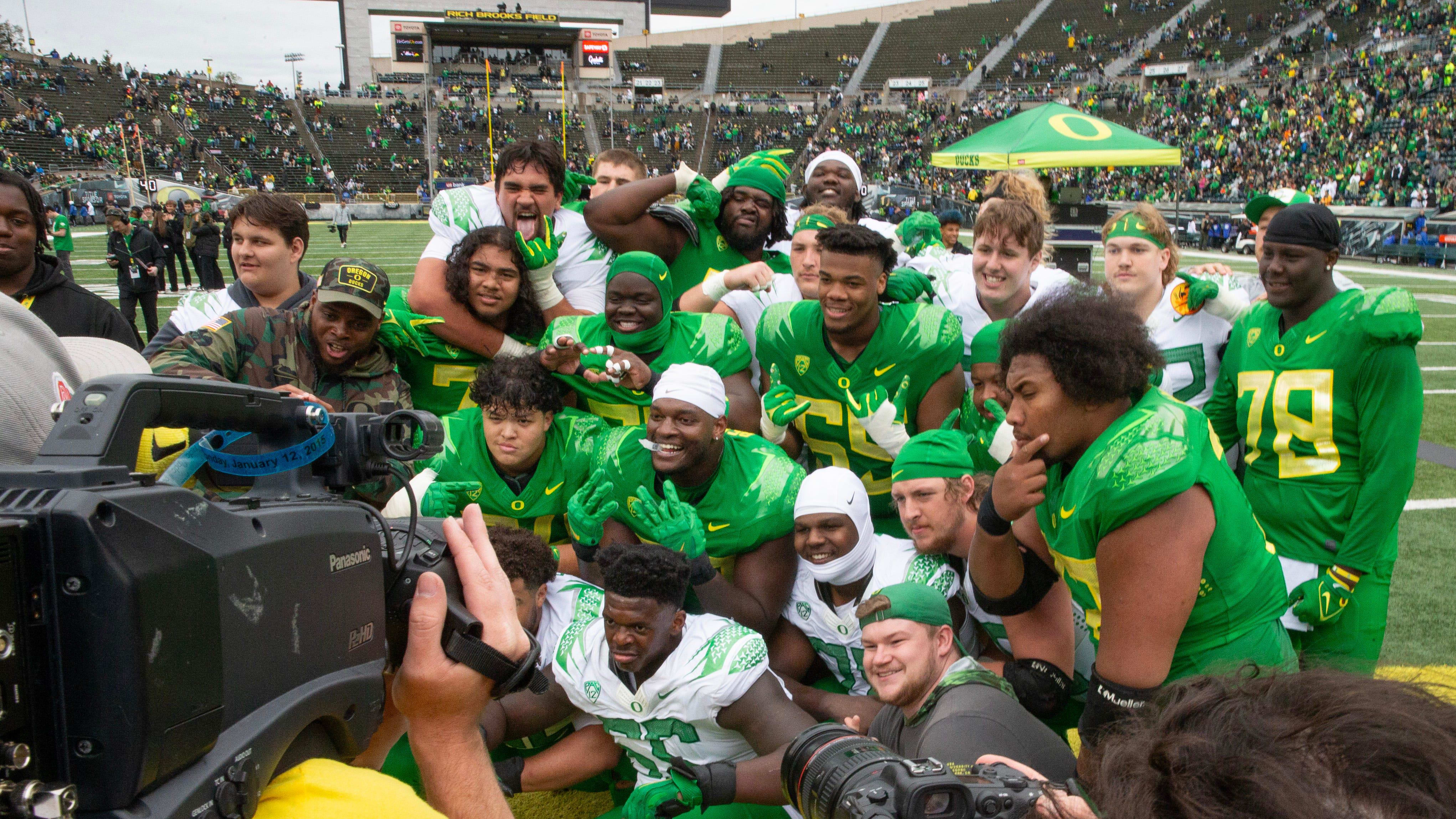
Oregon football players gather for a group photo after the Oregon Spring Game at Autzen Stadium
Chris Pietsch/The Register Guard / USA
Today on The Unafraid Show , I dive into the top five reasons student athletes enter the portal.
The reasons will challenge the narrative that the transfer portal is detrimental to the spirit of college sports. The reality is that the portal it offers necessary flexibility, and often relief for athletes navigating their unique circumstances that are often not their choice.
The staggering number of entries into the college football transfer portal is enough to make your head spin. From August 1, 2022, to May 1, 2023, 8,699 NCAA football players stepped into the portal from all levels D1- NAIA, according to ESPN. That’s up 5.5 percent from last year's record of 8,242 and more than double the number from the first cycle back in 2018-19, which was just a little over 4,000.
Zooming in on just the Football Bowl Subdivision, the FBS, we've seen a record-shattering 3,284 players dive into the portal. That’s a 6.5 percent jump from last year's 3,083, and about double the 1,717 from the 2018-19 season, per the stats gurus over at 247 Sports.
That 3,284 number means over 20 percent of all FBS players will be looking to make a move this offseason, whether by force, choice, or necessity. the game is changing, and these players are not just sitting around, and I’m sharing the top five reasons why.
George Wrighster hosts the Unafraid Show , featuring interviews of top athletes, coaches, and celebrities with a daily dose of sports content. A former Oregon football tight end, Wrightster was drafted in the fourth round of the 2003 NFL Draft to the Jacksonville Jaguars.
RELATED: Big Ten Conference Football Championship Odds After College Football Spring Games
RELATED: Oregon Basketball Schedule: Big Ten Conference Releases Opponents
RELATED: Oregon Football News: Ben Roberts, Collin Gill Enter Transfer Portal
Latest Ducks News

Ryder Lyons Has Strong Interest in Oregon Early On
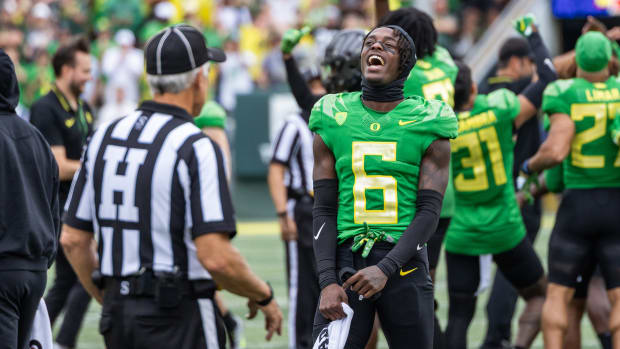
PODCAST: Which Position Group Will Grow the Most in Spring Football?
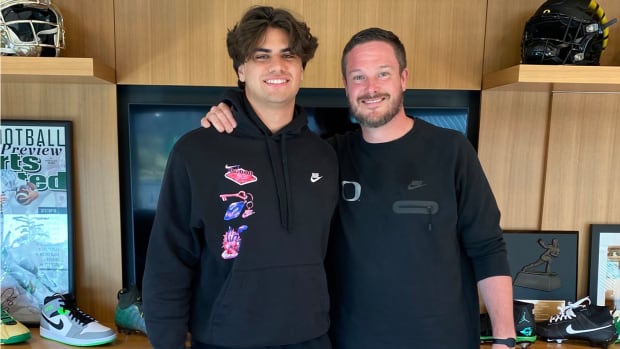
Oregon a 'Top Priority' for Noah Mikhail Following Visit
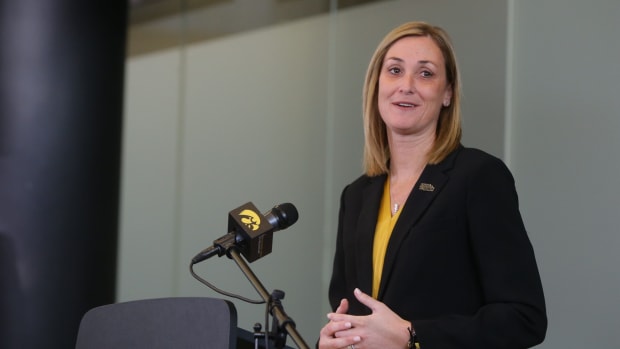
How Well Do You Know Big Ten Athletic Directors?
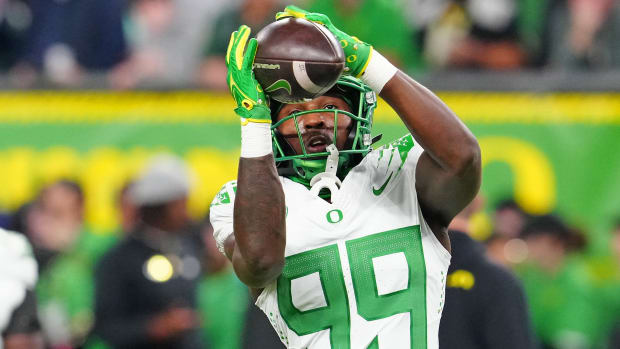
'He's ready now;' WR Jurrion Dickey Trending Toward Larger Role in 2024
- Skip to main content
- Keyboard shortcuts for audio player

Campus protests over the Gaza war
Top companies are on students' divest list. but does it really work.

A demonstrator protests outside the encampment established in support of Palestinians in Gaza at Columbia University on April 29, 2024. Columbia protesters are demanding their university sell off investments in a number of companies with business ties to Israel. Alex Kent/Getty Images hide caption
A demonstrator protests outside the encampment established in support of Palestinians in Gaza at Columbia University on April 29, 2024. Columbia protesters are demanding their university sell off investments in a number of companies with business ties to Israel.
It's become a common mantra by protesters at universities across the country: "Disclose, divest, we will not stop, we will not rest."
Broadly, the protesters want their universities to sell off their investments in companies that have businesses or investments in Israel because of the country's invasion of Gaza. That's where the term divest comes from.

College antiwar protests grow as students take over buildings on campuses

As student protesters get arrested, they risk being banned from campus too
The calls on campuses vary. Columbia University protesters, for example, have a broad list of divestment targets, demanding the Ivy League college disclose and unload investments in a broad set of companies with ties to Israel, including Google, Amazon and Airbnb .
Other protesters at universities are targeting defense-related companies and weapon manufacturers. Cornell University protesters are calling for divestments from companies including Boeing and Lockheed Martin.
Here's a look at what divestment means.
Why there's a call for divestments
Protests against university investments have a long history.
During the 1970s and 1980s, students at Columbia and other universities successfully pressed administrators to sell off investments in companies doing business with South Africa over the country's apartheid policies.
Since the 2010s, students have successfully called for some universities to divest themselves from companies tied to fossil fuels or to freeze their investments in that sector, including at Syracuse University.
Do divestments actually work?
Not really. Divesting by universities doesn't change corporate behavior, but it can provide a big moral and symbolic victory for protesters.
Most analysts agree that divestments don't usually punish the companies targeted. And some analysts argue divestments actually are worse in the long run. By staying invested, the reasoning goes, universities can have more of a say about a company's operations. Selling off their investments would likely be scooped up by other investors who are less likely to speak up.
For universities, divesting from companies that do business in Israel could also risk blowback from students, faculty or alumni who support Israel.
The University of California, for example, said it was opposed to "calls for boycott against and divestments from Israel."
"While the University affirms the right of our community members to express diverse viewpoints, a boycott of this sort impinges on the academic freedom of our students and faculty and the unfettered exchange of ideas on our campuses" the university said last week.
These are big reasons why almost no university has yet agreed to divest from investments tied to Israel, though a few have been willing to hold talks with protesters.
Protesters are pressing on, however. That's because getting a university to divest from companies with ties to Israel would not only achieve their goals, it would also likely serve as a moral victory by sparking a lot of headlines and debate.
"Divestment itself doesn't really influence the companies or the industries being targeted directly," said Prof. Todd Ely from the School of Public Affairs at the University of Colorado Denver. "It's more the stigma created and drawing attention to the issue more broadly."

A person stands among tents at an encampment set up by pro-Palestinian protesters on the campus of Columbia University on April 25, 2024. Leonardo Munoz/AFP via Getty Images hide caption
A person stands among tents at an encampment set up by pro-Palestinian protesters on the campus of Columbia University on April 25, 2024.
Can universities actually do it?
Yes, but it can be complicated.
Endowments at the nation's top universities have grown into multi-billion dollar chests, with investments in all kind of investment funds, including specialized private funds that prevent people from cashing out for a number of years.
More broadly, endowments have become a vital source of financing for universities. They allow for investments and scholarships while securing the university's financial future.

What a 1968 Columbia University protester makes of today's pro-Palestinian encampment
Some endowment chiefs have even become well known figures in finance, including the late David Swensen who served as Yale's chief investment officer and grew the university's funds massively.
Endowments "are intended to kind of preserve and grow the resources available to colleges and universities. And the number one use of those funds is to support students and student financial aid," says Prof. Ely. "So it's a complex situation where calls to change the way these funds are invested by students and other interested parties do end up kind of in a circular way going back to support the students themselves."
- columbia university
- boycott, divestment and sanctions
- college protests
These college students are mad about Gaza – but it won’t drive their vote: From the Politics Desk

Welcome to the online version of From the Politics Desk , an evening newsletter that brings you the NBC News Politics team’s latest reporting and analysis from the campaign trail, the White House and Capitol Hill.
In today’s edition, national political reporter Ben Kamisar breaks down our latest focus groups with young voters in battleground Wisconsin. Plus, senior national political reporter Jonathan Allen notes how President Joe Biden leaned into a "law" and "order message in response to campus protests.
Sign up to receive this newsletter in your inbox every weekday here.
These young voters are mad about Gaza — but don’t see it driving their vote
By ben kamisar.
They’re mad about the situation in Gaza, and they’re not going to take it anymore. But they probably aren’t going to vote on it.
That was the key takeaway from the latest NBC News Deciders focus groups — in collaboration with Engagious , Syracuse University and Sago — of independent Wisconsin college students. Virtually all of the 16 students we spoke to backed the wave of pro-Palestinian protests sweeping college campuses and held dim views of President Joe Biden’s handling of the Israel-Hamas war, and some have even participated in the protests themselves.
Do you have a news tip? Let us know
Pushed to reckon with how the issue may influence their vote in the presidential election, few said they expected it to change who they will for, except for a few who questioned whether they may be less likely to cast a ballot at all.
Why? Largely because they don’t see Biden and former President Donald Trump as having meaningfully different stances on Israel.
“I don’t think Biden is doing a great job; I don’t think Trump would do a better job. … As it stands, I can’t see it changing how I vote.” — Cooper M., a 19-year-old University of Wisconsin-Eau Claire student who is currently backing Biden
But even if Biden’s handling of the war is not likely to be a main driver of their votes, it’s clear these students feel passionately about it and are almost unilaterally supportive of these protests.
“It’s completely unfair for students who are paying tuition to not have a say in where their money goes.” — Suchita H., a 19-year-old student who is backing Biden and attends the University of Wisconsin-Madison
“The protests are very empowering to see a lot of young people on these campuses rising up together in solidarity with Gaza and the Palestinian people.” — Sophia K., an 18-year-old UW-Madison student who said she would vote for Green Party candidate Jill Stein
None of the students had decided to join the encampments themselves, even those who had attended the protests. And the majority of them drew the line against protesters occupying buildings, as has happened on some campuses like Columbia University. Four students said they supported the tactic.
“I would not prefer it, but I do think that’s almost the only way. A lot of people who talk about peaceful protest don’t realize that the point of protest is to carry out radical change, and as long as it’s peaceful and not getting in anyone’s way, that’s exactly when no one cares about it.” — Suchita H.
“It’s going to make the tuition rates go up even more if we start destroying the resources that we have already. I just think it’s unproductive to be destroying what we already have.” — Angelina J., a 19-year-old University of Wisconsin-Oshkosh student who said she would vote for Robert F. Kennedy Jr.
Read more from the latest NBC News Deciders focus groups, including how these voters view a potential TikTok ban →
Biden’s ‘law’ and ‘order’ message on campus protests
By jonathan allen.
Biden emphasized two words Thursday when he addressed the nationwide campus protests over Gaza: “law” and “order.”
Notably, Biden didn’t use them in the same phrase, avoiding the timeless echo of Richard Nixon that Donald Trump repeated during the 2020 protests following George Floyd’s killing.
Nevertheless, Biden’s message was clear: He doesn’t stand with protesters who break the law.
“Peaceful protest is in the best tradition of how Americans respond to consequential issues,” Biden said. “But neither are we a lawless country. We’re a civil society, and order must prevail.”
Of course, each protest is different. The grievances of the Vietnam generation are distinct from those of people who demonstrated against police violence in 2020 and the current set that wants the U.S. to stop funding Israel as it wages war in Gaza.
But Biden’s remarks hint at the political risks of perceived chaos. He’s trying to win swing voters in swing states, and the ongoing protests have included rhetoric and behavior that are well outside the mainstream.
“It’s against the law when violence occurs,” he said. “Destroying property is not a peaceful protest. It’s against the law — vandalism, trespassing, breaking windows, shutting down campuses, forcing the cancellation of classes and graduations.”
And, he added, “Dissent is essential to democracy, but dissent must never lead to disorder.”
Biden is obviously walking a tightrope between those in his party who agree with the sentiments of the pro-Palestinian protesters and those who are either alienated by the demonstrators’ views or the ways in which they are being expressed.
But if he falls off, he’s going to be sure it’s on the side of “law” and “order.” No doubt he remembers Nixon and Trump saying it.
Read more on how Trump is trying to make the campus protests a political liability for Biden →
Trump trial, Day 10: Former Stormy Daniels attorney recounts hush money deal struck before 2016 election
By adam reiss, jillian frankel, gary grumbach and dareh gregorian.
Trump’s hush money trial resumed Thursday in a Manhattan courtroom with a former lawyer for adult film star Stormy Daniels recounting the deal struck days before the 2016 election to suppress her claims that she had a sexual encounter with Trump — and the role he suggested the deal may have played in his campaign victory.
“What have we done?” attorney Keith Davidson said in a text sent on election night to the National Enquirer executive who’d helped him to mediate the deal. “Oh my god,” responded the exec, Dylan Howard, who was the Enquirer’s editor-in-chief at the time. He described the text as “gallows humor” about their understanding that “our activities may have in some way assisted the presidential campaign of Donald Trump.”
On cross-examination, Trump’s attorney Emil Bove tried undermining Davidson’s credibility by asking him about other salacious tabloid stories he had been involved with, including people who peddled sex tapes featuring wrestler Hulk Hogan and influencer Tila Tequila, and a person who allegedly leaked information about actress Lindsay Lohan’s stint in rehab.
Davidson was evasive with his answers, saying he couldn’t remember details about specific cases. “I had over 1,500 clients in my career,” he said.
He acknowledged that he was investigated for extortion in relation to the Hogan tape back in 2012. “That is true,” he told Bove, while denying any wrongdoing.
Read more from the Trump trial →
🗞️ Today’s top stories
- 🚫 Casting doubt: In interviews with 50 Republican voters across a dozen states, a majority said they wouldn’t accept a Biden victory this fall as legitimate. Trump again said in an interview with the Milwaukee Journal Sentinel that he may not accept the 2024 presidential election results. Read more →
- 🗓️ Biden’s past opponents speak: The New York Times spoke with a handful of Republicans who ran against the president during his decades in the Senate, unearthing pieces of trivia like the fact that opponents aired only one negative ad against Biden from 1978 to 2008. Read more →
- 🇯🇵 Friends like these: Biden called Japan “xenophobic” as he said their economy is “having trouble,” comments the U.S. ally has not yet responded to. Read more →
- 🌵 Raising (the abortion issue in) Arizona: Democratic Gov. Katie Hobbs signed a bill repealing Arizona’s near-total abortion ban. The issue has also added another layer to a crowded and competitive GOP congressional primary that includes the state House speaker. Read more →
- 🏠 Gen Z in the House? 27-year-old Joe Vogel, the youngest Maryland state delegate in history, is looking to double Gen Z’s representation in the House as he runs in the state’s open 6th District. Read more →
That’s all from The Politics Desk for now. If you have feedback — likes or dislikes — email us at [email protected]
And if you’re a fan, please share with everyone and anyone. They can sign up here .

IMAGES
VIDEO
COMMENTS
Start planning early. As students get closer to the final year of high school, their schedules are filled trying to balance school and a social life - all while exploring potential college ...
A campus visit is a planned visit to a college or university campus. It involves a guided campus tour, information sessions, and meeting with admissions officers. Visitors can interact with current students, explore the campus community, and see if the college matches their interests and goals. The purpose is to provide firsthand experience and ...
Step 2: Call the college or university's admissions office. Don't set up a visit online. Talk to an actual person. Or, if you do set up a visit online, call and make sure the admissions office received your scheduled visit—and that it didn't get lost in cyberspace. Have a detailed conversation about what you'd like to do when you're ...
And you can plan your own informal visit to a college campus. Take these important steps first: Visit the college's admissions website to get details about arranging for an in-person visit. Check with your school counselor to see if any campus tours are scheduled. Set aside time to be on your own. Walk around the public area.
Here's an ultimate checklist to ensure you cover all bases during your college campus visits. Gather Basic Information: Start your preparation by researching the college's size, academic programs, student-to-faculty ratio, campus setting, and overall culture. This foundational knowledge will help you focus your visit.
Talk to students and ask questions (i.e. how they're enjoying their classes or what campus life is like) Explore the area surrounding campus. Read the college newspaper. Scan the bulletin boards around campus for upcoming events and announcements. Schedule an overnight and spend the night in the dorms with a current student.
Things to Do on a Campus Tour. Gather Important Information. Pick up brochures, financial aid forms, and the campus map. Try to sit at the back of a classroom that interests you. If classes aren't in session, you can still stop in a classroom or lecture hall to get a sense of the environment. Meet a professor who teaches a course you're ...
Ask about the best times to visit. 3. Take Your Own Tour. Wandering around the campus on your own or with friends can be the best way to get a feel for the college. 4. Explore the College's Facilities. Talk to students to find out the best places to eat and have lunch there. Visit the library.
Virtual college tours and information sessions can be valuable alternatives for colleges that are harder to visit in person. For instance, Harvard tours can be in-person or virtual. Therefore, if Harvard is on your list, plan your Harvard tours accordingly based on your availability and resources. 4.
This is a big decision no doubt. When it comes to college visits, then, it's no surprise that they can feel overwhelming. So here are 25 tips for how to have a great college visit that is smooth, informative, and even fun. 1. Visit during your junior year. It's a good idea to visit a college campus or two in the few first years of high ...
Most high schools allow for, at least, a few absences in the junior and senior year for college visits. 3. Make a plan. If you have nearby schools on the list, take day trips. Use longer breaks for schools that are farther away and, obviously, group nearby schools together. If you're planning to drive to school visits and your child has a ...
Related: 5 College Visit Tips No One Told You About Until Now. Prepare yourself and your questions. Prior to visiting any campus, you should develop a list of questions for various audiences. You want a series of fact-finding questions for admission officers; these should focus on the application process, evaluation criteria, and important ...
Get the most out of your time on campus with our college visit checklist: 1. Mind the calendar. Schedule your visit while school is in session. You won't get a realistic idea of student life in August (or if you attend during a special event like Spring Fling). 2. Meet the experts. Talk to the current students—they may soon be your peers.
Here are 11 tips. 1. Prepare in Advance. Whether you plan to visit one or seven colleges, you will want to be prepared. Research the college in advance, look at a campus map, and pick out some things that interest you. Call the admissions office, set up a guided tour, and ask about the best times of year to visit.
Here are 32 example questions, collected from college admissions and enrollment professions, that students don't always think to ask on college visits. These questions - edited for length or ...
Finding your way around a small, rural college can be stressful, too, so plan to arrive early when creating your college visit schedule. Here are a few ideas on what you can plan before your visit: Register for information sessions and tours. Arrange to meet with a professor or advisor in your program of choice.
Go to the college's website, and click on the "Admissions" tab. 2. If it's a university where graduate programs are option, be sure to go to undergraduate admissions. 3. Click on the "Visit" or "Visiting Campus" tab. 4. Choose the right option for your visit—e.g., Daily Visit, Weekend Visit (if offered). 5. Check the calendar for an ...
To make your reservation, visit the college's website and find the page that is dedicated to prospective students. The webpage will be filled with information about planning and reserving a campus tour, which may need to be done through the website, email, or phone. Step 3: Prepare Questions for your College Visit.
You want to have at least some idea of what to expect on your college visit. The best way to get this information is by doing extensive research. Spend some time and go through the college website in detail. Scroll through the various programs and facilities that the college offers. Don't just focus on your academic interests.
Compare what you did and didn't like. Meet professors of your desired department and ask them about the program. Check out the dining hall, the student center, or any other popular places that enrolled students frequently visit. Ask about campus safety policies. Check out housing and dorm options on and around campus.
Your Guide to College Visits. April 30, 2024. Whether you're planning an epic cross-country college search road trip, or keeping your hunt local - visiting campuses is one of the most important parts of the college search process. There is no better way to get a real feel for what a school is all about. To help you make the most of your ...
Notice the buildings on campus, the interactions between students, and the overall atmosphere. Take lots of notes and pictures to help you remember your experience when you've returned home. Preparing for a college campus visit involves more than just showing up. With some research, an intentional plan, and clear goals, you can ensure that ...
Visits involve a lot of walking. So wear comfortable shoes and prepare to get your steps in. Check the forecast before your visit and make sure you wear something weather-appropriate, and bring an umbrella in case there's rain. In terms of how much you need to dress up, there's no need to wear anything formal.
Treat yourself: When you do meet those goals, reward yourself. For example, if you're in the middle of binge-watching a great show, allow yourself to watch an episode if you meet your study goals for the day. 2. Participate in extracurricular activities.
For an in-person visit, families should prepare ahead of time by checking the weather and dressing comfortably as tours are mostly held outside. ... 14 Tips for an Effective College Visit.
The spring of your junior year is a good time if you've already researched colleges. Spring break is also good if you play fall sports or are considering applying under early action or early decision plans, which usually have application deadlines in November of your senior year. Early fall is also a good time for seniors to visit.
The Oregon football program continues to stay active in adding talent. The latest addition being Derrick Harmon, the top-ranked defensive lineman from Michigan State, who has chosen to transfer to ...
From August 1, 2022, to May 1, 2023, 8,699 NCAA football players stepped into the portal from all levels D1- NAIA, according to ESPN. That's up 5.5 percent from last year's record of 8,242 and ...
As student protesters get arrested, they risk being banned from campus too. The calls on campuses vary. Columbia University protesters, for example, have a broad list of divestment targets ...
Biden emphasized two words Thursday when he addressed the nationwide campus protests over Gaza: "law" and "order.". Notably, Biden didn't use them in the same phrase, avoiding the ...